Veterinary & Biosecurity
Mak Launches Facility to Support Dairy Technology & Infrastructure Improvement
Published
3 years agoon
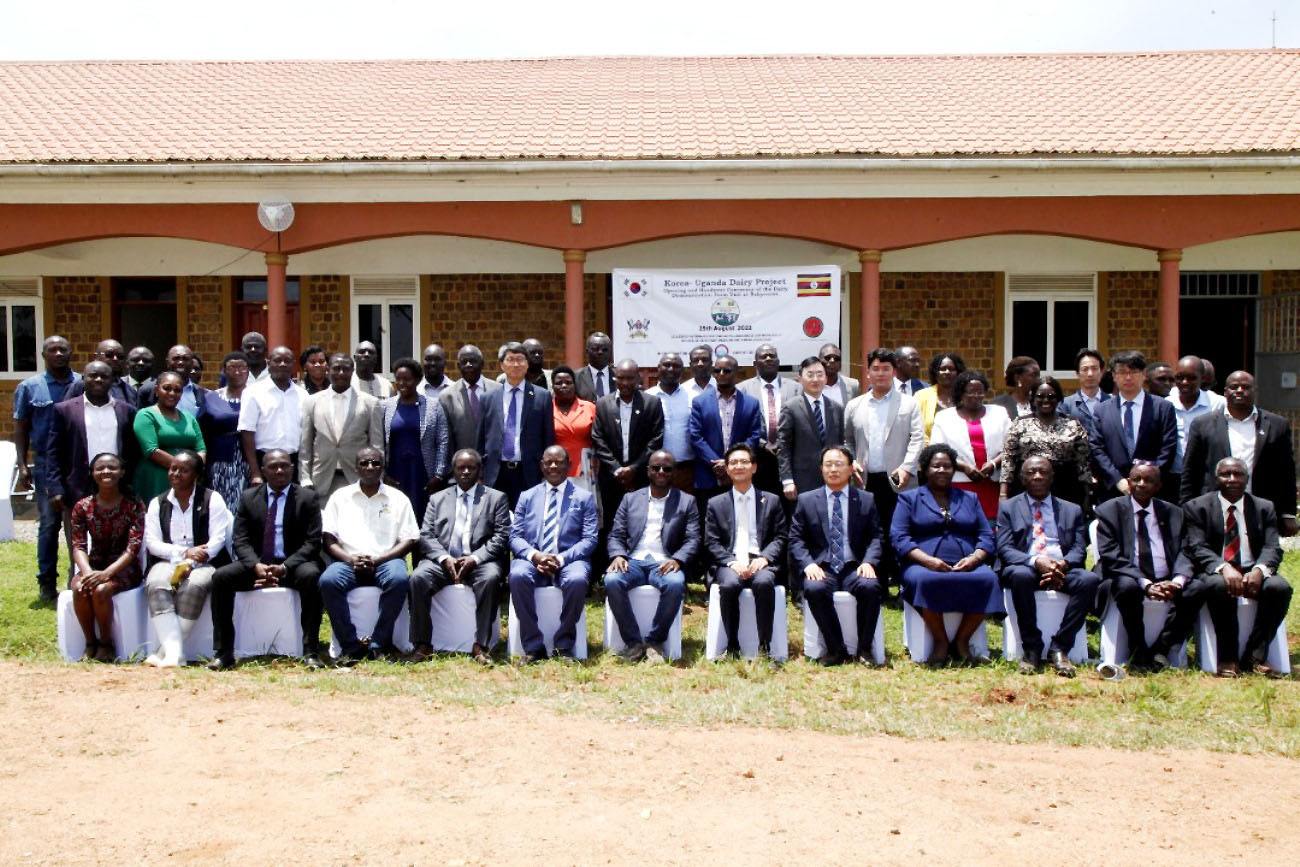
The Korea Rural Community Corporation (KRC) on Thursday 25th August 2022 officially handed over a facility aimed at “Improving Productivity of Dairy Farmers by Supporting Dairy Technology and Infrastructure in Uganda” to Makerere University. Implemented under the Korea Uganda Dairy Project (KUDaP), the facility is housed at the Nakyesasa Incubation Centre, College of Veterinary Medicine, Animal Resources and Biosecurity (CoVAB), on the fringes of the National Crops Resources Research Institute (NaCRRI) in Namulonge. The ceremony was presided over by the Chairperson Appointments Board, Counsel Innocent Kihika, who represented both the Deputy Speaker, Rt. Hon. Thomas Tayebwa and the Chairperson, Makerere University Council, Mrs. Lorna Magara.
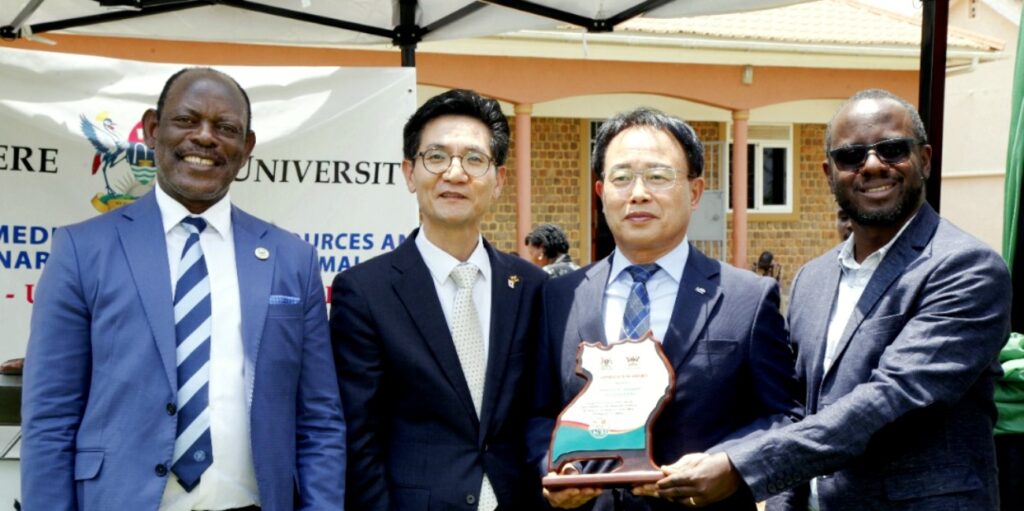
The facility was handed over to the Principal CoVAB, Prof. Frank Norbert Mwiine by the Vice President KRC, Hon. KIM Byung-Soo following a tour of the premises, where the investment in dairy technology and infrastructure was appreciated. Present were the Ambassador of the Republic of Korea to Uganda, H.E. PARK Sung-Soo, the Vice Chancellor, Prof. Barnabas Nawangwe, the Commissioner for Animal Health in the Ministry of Agriculture, Animal Industry and Fisheries (MAAIF), Dr. Anna Rose Ademun Okurut who represented the Permanent Secretary Maj. Gen. David Kasura Kyomukama.
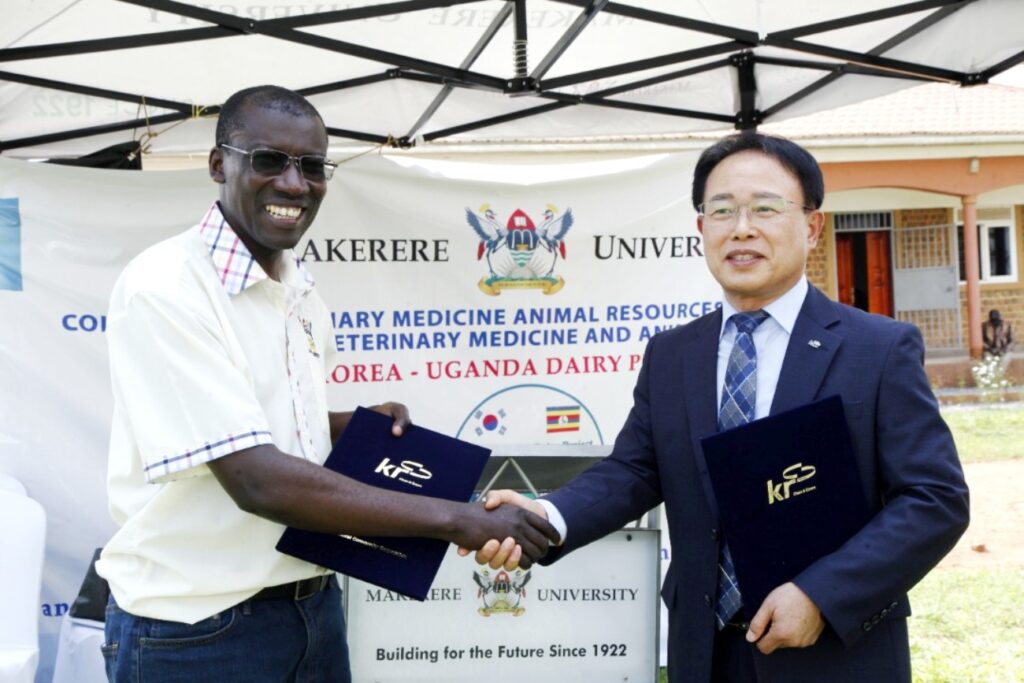
Others were the Chairperson KUDaP Steering Committee, Prof. William Bazeyo, Executive Director, Dairy Development Authority (DDA), Dr. Michael Kansiime, KUDaP Project Manager, Prof. LEE Hak-Kyo, KUDaP Principal Investigator and Dean School of Veterinary Medicine and Animal Resources (SVAR), CoVAB, Prof. Robert Tweyongyere, Assistant Commissioner Information and Communication, MAAIF, Ms. Consolata Acayo, Members of Makerere University Management, Officials from the Korea International Cooperation Agency (KOICA), Jeonbuk National University (JNBU), Korea, Uganda Veterinary Association (UVA) President, Dr. Daniel Kasibule among others.
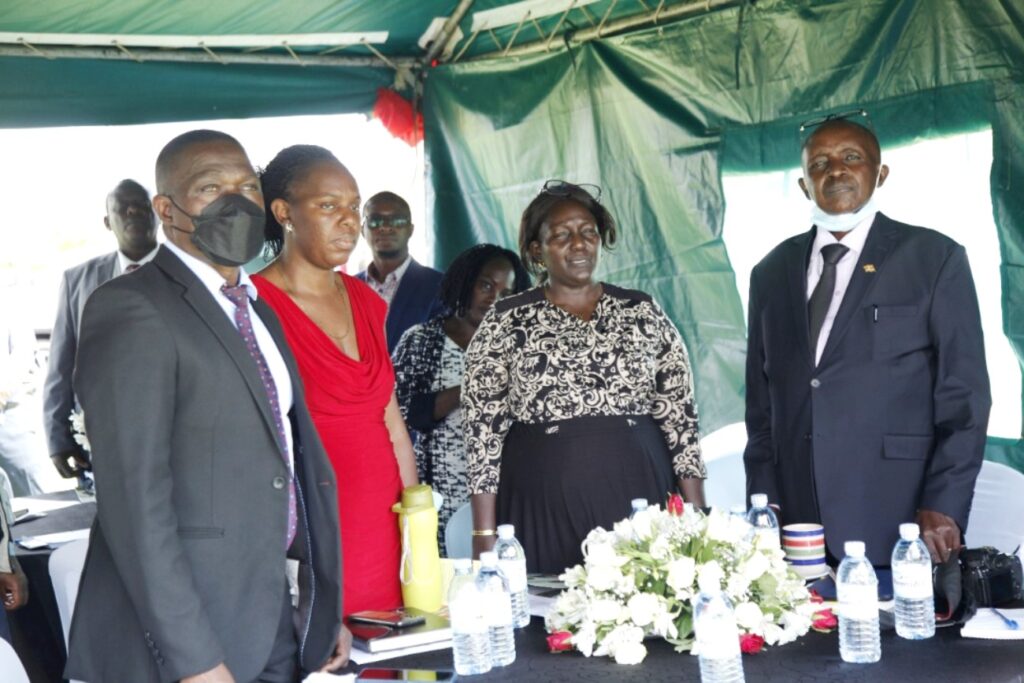
KUDaP came into force following the signing of a Memorandum of Understanding (MoU) between the Ministry of Finance, Planning and Economic Development (MoFPED) and the Ministry of Agriculture, Food and Rural Affairs (MAFRA) Korea on 17th December 2018. The project that commenced in February 2019 is implemented by SVAR and the National Animal Genetic Resource and Data Bank (NAGRC&DB) in collaboration with JNBU. It is aimed at: Establishing a model farm to train students, dairy farmers, extension workers and Artificial Insemination Technicians; Establishing an elite dairy herd in Makerere University; and Promoting improved dairy production practices in Uganda.
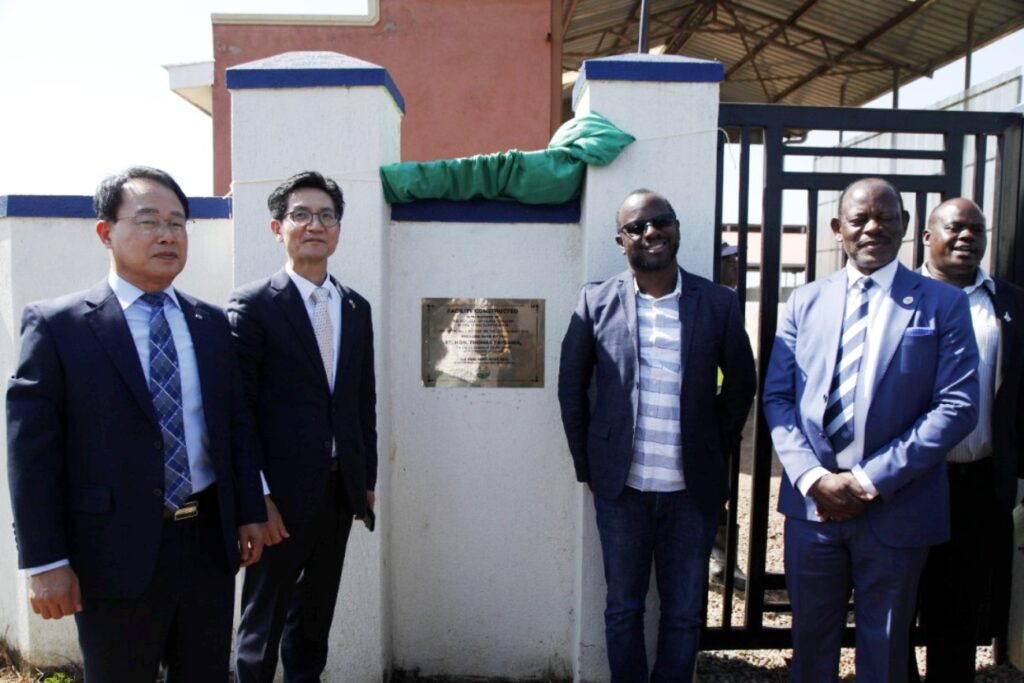
The components of the KUDaP Project are;
- Construction of a Dairy Demonstration Farm Facility at Makerere;
- Provision of dairy cows, high quality semen and embryos to farmers;
- Capacity building in dairy feeds production; and
- Upgrading/supporting breeding laboratory capacity at NAGRC&DB as well as human capacity development in Dairying in Uganda.
In his remarks, the Guest of Honour, Counsel Innocent Kihika congratulated Makerere University and CoVAB in particular upon successfully commissioning the Dairy Development Project, especially during a year when both the institution and college mark 100 and 50 years of existence respectively, two years into the implementation of the ten-year strategic plan.
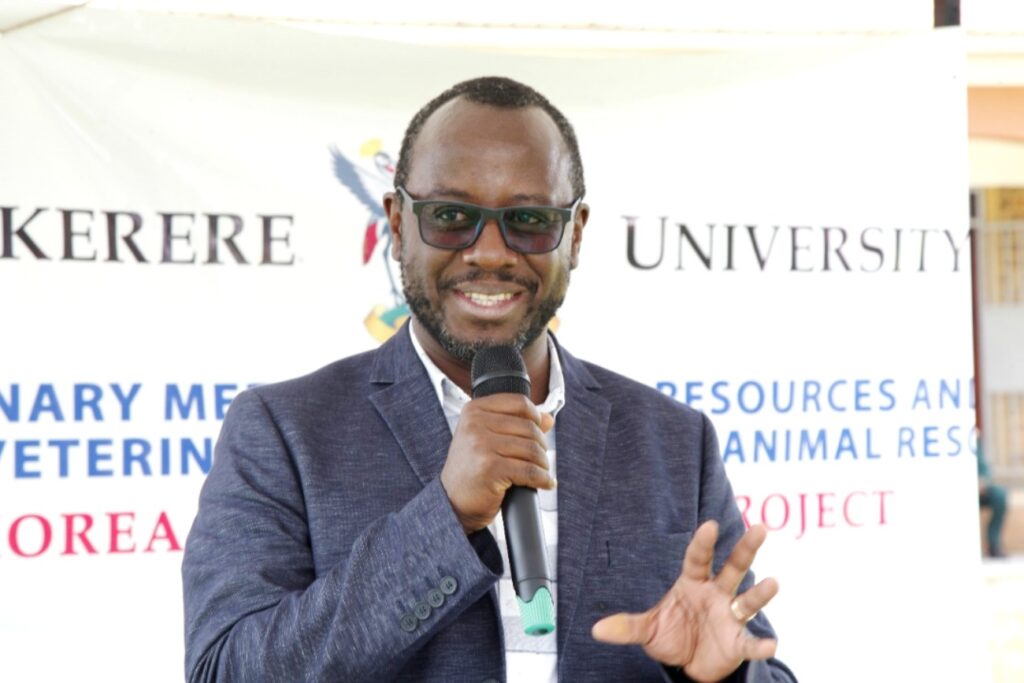
“The Council has continued to emphasise the need to align our research with the requirements of national development as articulated in the National Development Plan and various instruments of Government and the private sector” he said.
Counsel Kihika emphasised that agriculture remains a primary employer in Uganda and any improvements in the sector would directly contribute to the growth of decent jobs in the value chains. “I must say that right now people are very excited with what is happening with Uganda’s oil in the Albertine rift valley but when you go deep into that, you will see that agriculture is the core of our economy and the oil is just a catalyst to that.”
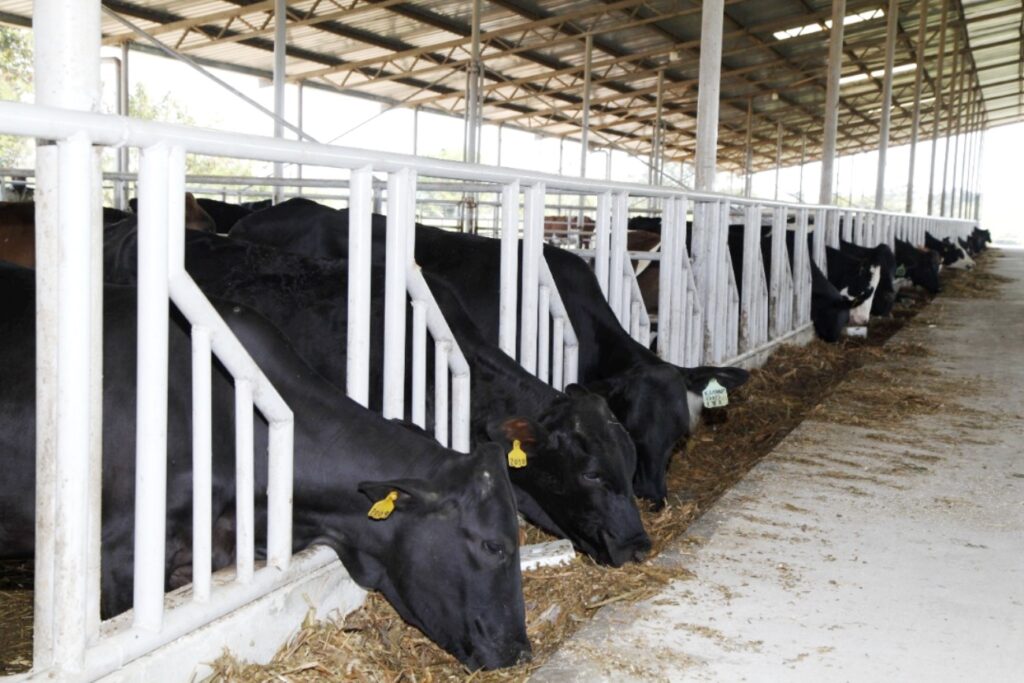
The Guest of Honour noted that the commissioning of the facility at Nakyesasa positions Makerere University for robust research and technology transfer in the dairy sub-sector as part of the institution’s continued contribution to national development. He extended an open invitation to Ambassador PARK Sung-Soo to be a part Makerere‘s plans to develop its seven square mile acre property in Kyankwanzi District as well as the Buyana Stock Farm in Mpigi District.
“I wish to pledge the Council’s commitment to continuously improving the framework conditions for research through policy making, facility linkages with the relevant government entities and mobilising the required human resources” he concluded.
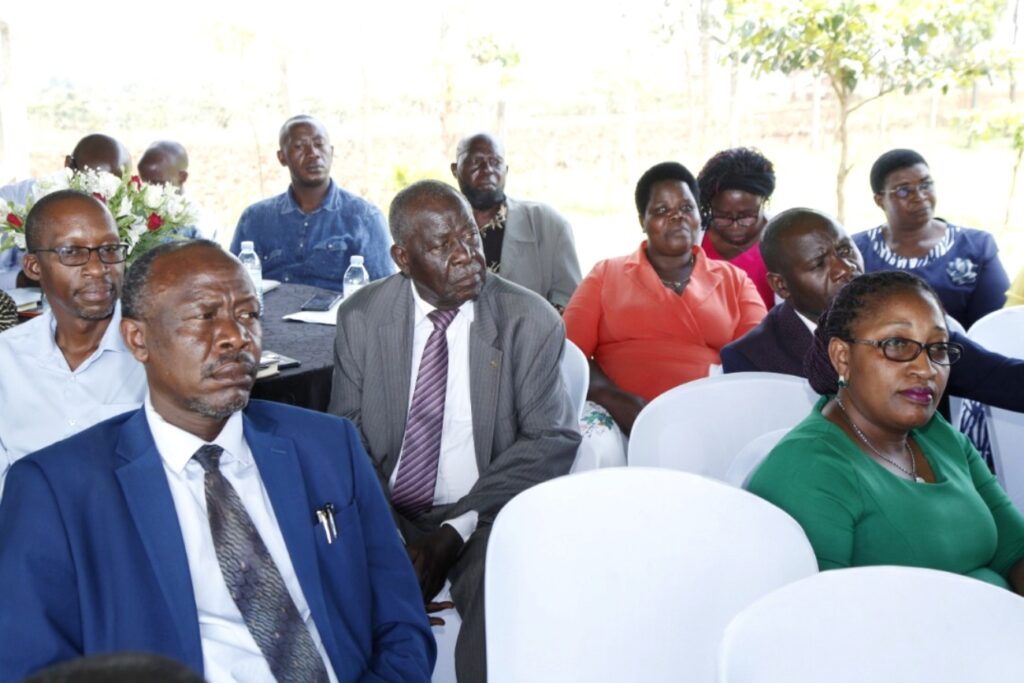
Reiterating the emphasis of agriculture to Uganda’s economy, Ambassador PARK Sung-Soo admitted that the sector has been a pertinent issue in the Republic of Korea’s partnership strategy with Uganda. He added that the KUDaP project is very meaningful for the future of Uganda because as everybody knows, this future lies in rural development.
“Agriculture including livestock and dairy industry is the backbone of Uganda’s economy. The dairy industry is especially a promising sector in Uganda’s agriculture; it is growing at a rate of 8-10% every year” remarked the H.E. Park.
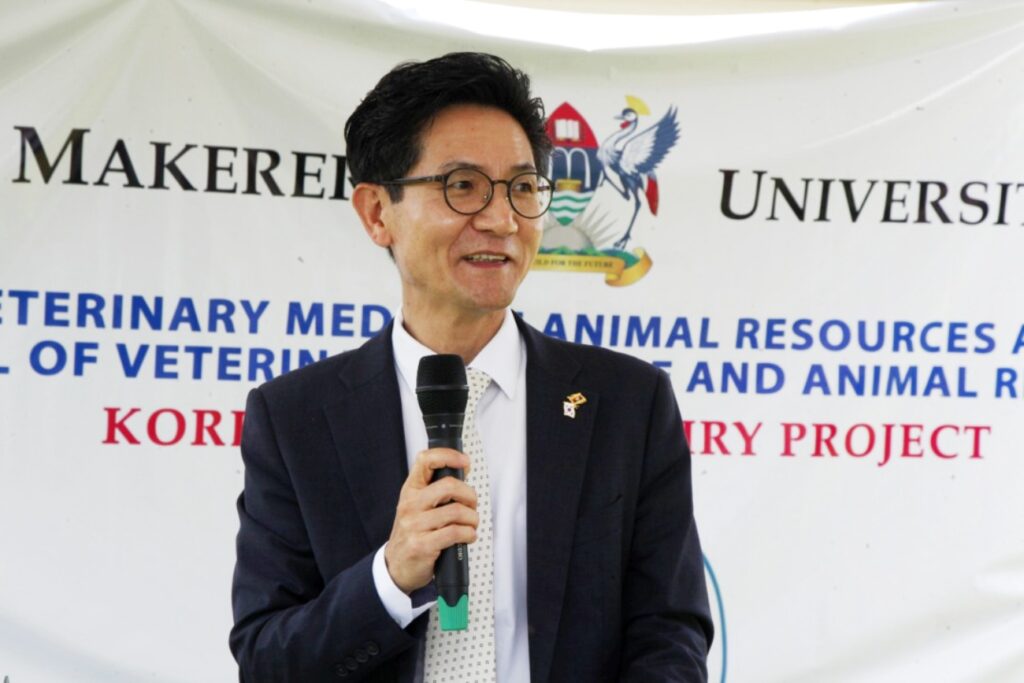
The Ambassador added that the new President of the Republic of Korea, H.E. YOON Suk-Yeol is desirous of strengthening his country’s relationship with African Heads of State, with a special Korea-Africa summit planned for the second half of 2024 in Seoul. “I am 100% sure that this event will create new momentum to open a new chapter in the Korea-Africa cooperation and I believe that Uganda will be a part of this history-making process.”
He congratulated Makerere University upon celebrating 100 years of existence and pledged to continue strengthening cooperation and knowledge exchange with the institution. “I really hope that through this dairy project, Korea and Uganda may strengthen our mutual understanding and trust and extend our cooperation and collaboration into other fields and areas.
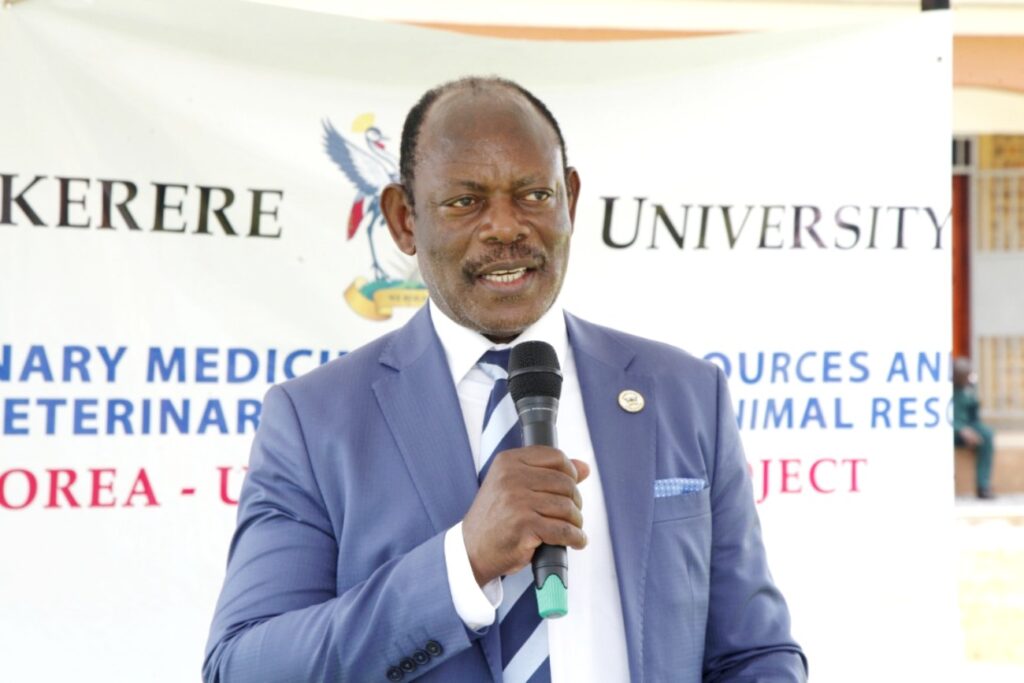
Addressing the gathering, the Vice Chancellor, Prof. Barnabas Nawangwe emphasised the readiness by Makerere and CoVAB to demonstrate that they are doing things differently especially as they celebrate their 100th and 50th anniversaries respectively.
“The facility was have launched today is a demonstration that we are ready to do things differently and that we are becoming more relevant to our community. As the top national university, we must address the challenges that face our country, whose population is growing exponentially” remarked Prof. Nawangwe.
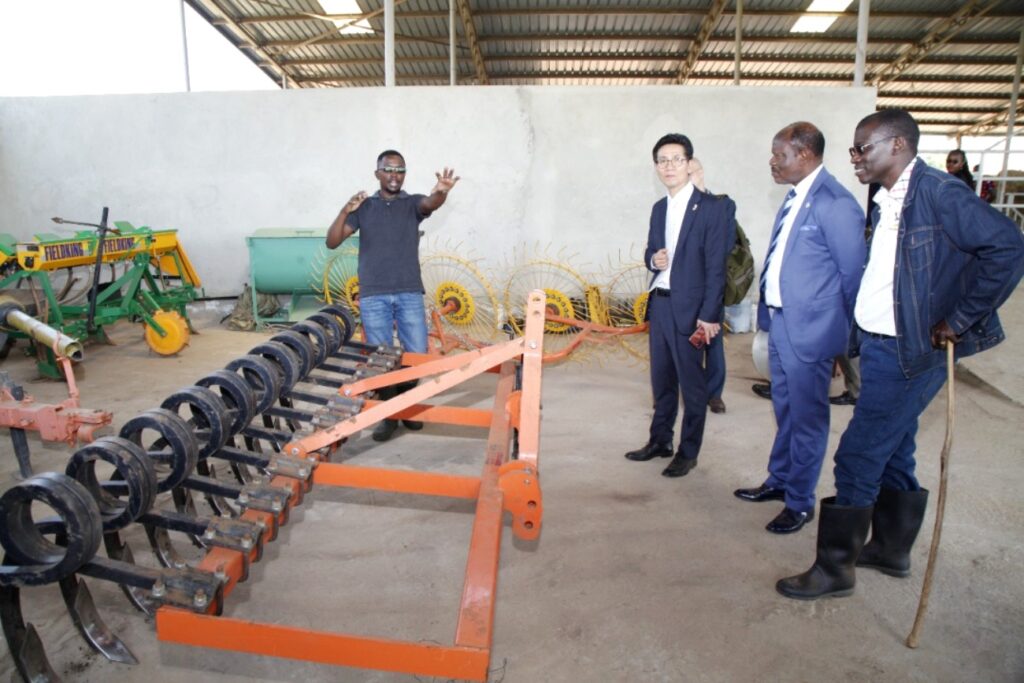
The Vice Chancellor through the Ambassador thanked the Government and people of the Republic of Korea for the generous support that led to the establishment of the facility that will benefit not only Makerere but also Ugandan farmers in the dairy sub-sector.
“I wish to pledge our total commitment to ensure the proper management and maintenance of this facility. We will play the role expected of us, especially the recruitment of the necessary human resource and payment of all the utility bills” said Prof. Nawangwe.
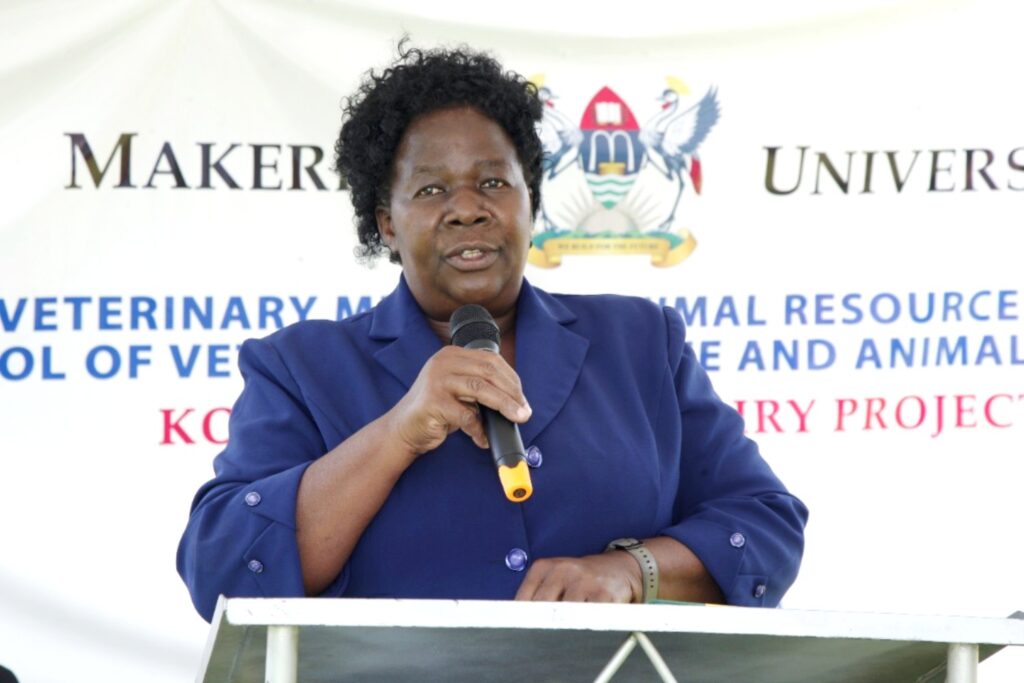
Speaking on behalf of the Permanent Secretary MAAIF, Dr. Ademun Okurut noted that the Dairy Demonstration Farm will play an important role in improving the livelihood of approximately 1.7million Ugandan households who depend on milk for nutrition, food security and employment.
“Currently we are running the Parish Development Model (PDM) and our extension service is now going further to ensure that production reaches the remaining 35% of our population that are not in the money economy” remarked Dr. Ademun Okurut.
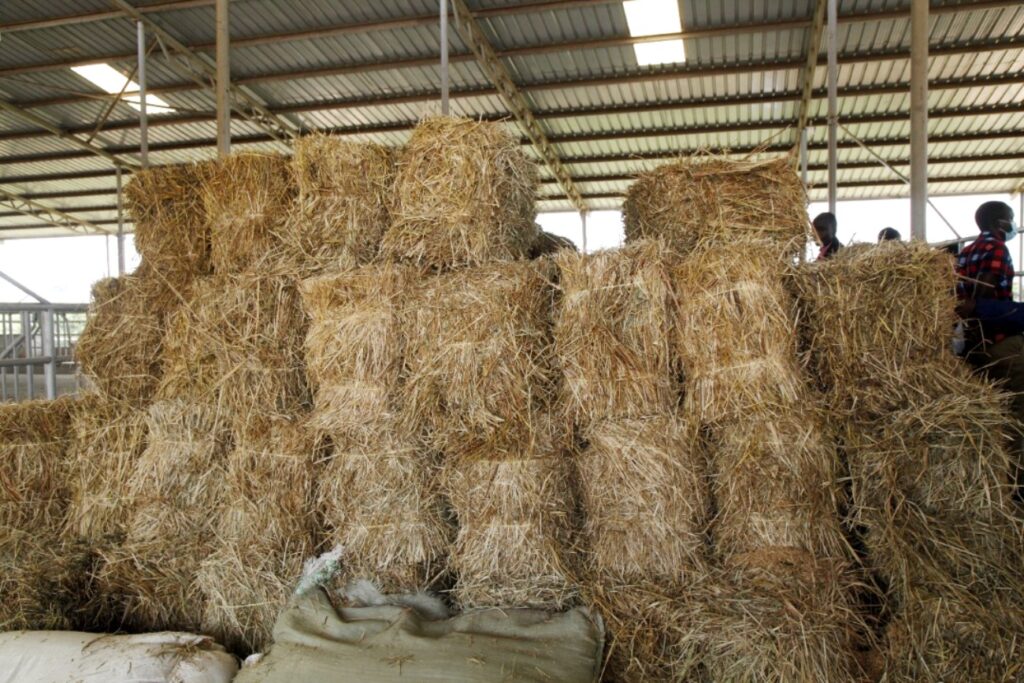
She further shared that the Government had developed and is actively promoting a strategy on food and animal feed security, aimed at responding to the two failed season and alleviating any foreseeable shortages both in the short and long-term.
Dr. Ademun Okurut congratulated Makerere University on the project milestone, noting that it was an indication of institutional commitment to address the needs of our community. She acknowledged the fruitful collaboration with JNBU and the financial support of KRC and pledged her Ministry’s commitment to continued partnership with Makerere University and the furtherance of KUDaP as well as other projects of national importance.
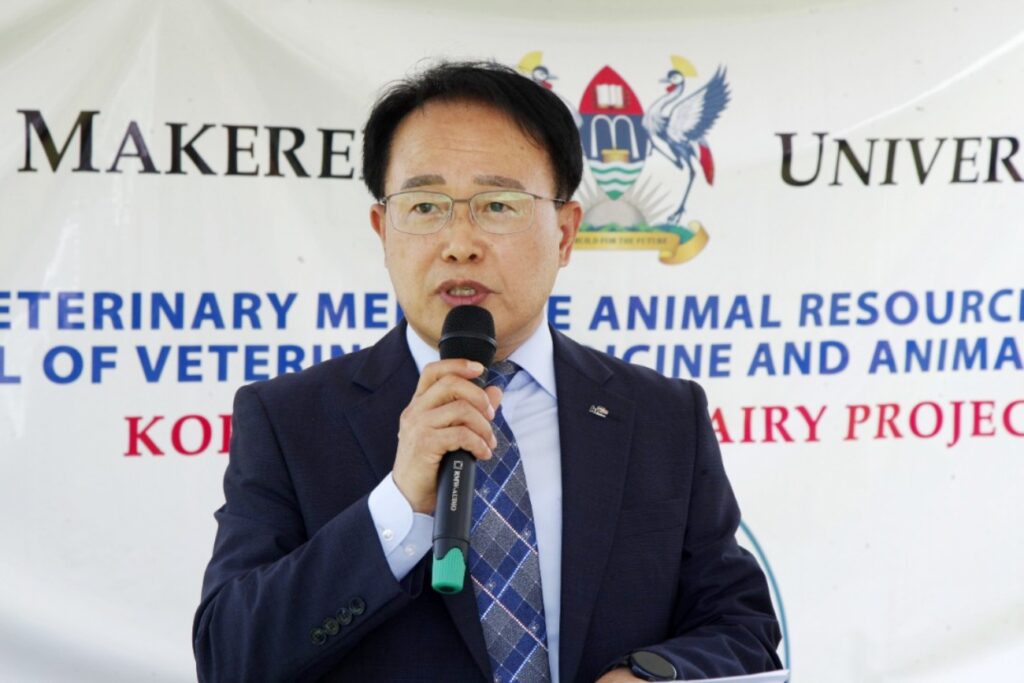
On behalf of KRC, Hon. KIM Byung-Soo congratulated the Ugandan Government, Makerere University the Project Manager Prof. LEE Hak-Kyo upon the successful completion of the project, noting that it was an affirmation of “cooperation based on the principles of reciprocity and mutual interest”.
“I hope that after this ceremony, the corresponding Ministries and departments in Uganda and Korea will make further efforts to promote our cooperation in order to take Korea-Uganda relations and strategic partnership to a higher level” he added.
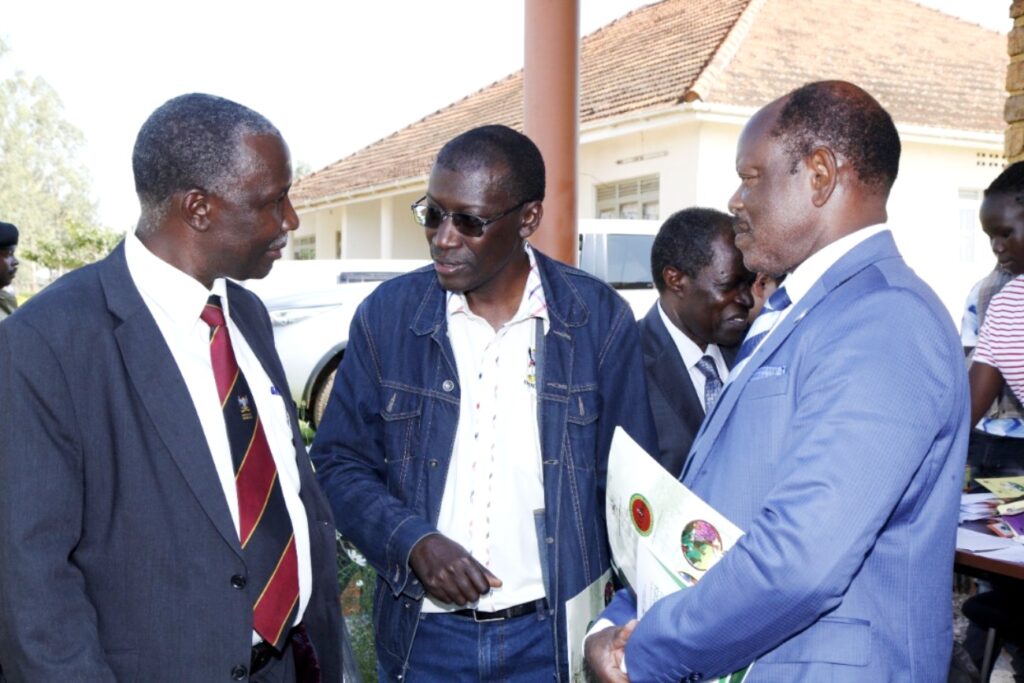
As any proud father would the Principal CoVAB, Prof. Frank Norbert Mwiine could not help but speak with pride of what would be achieved through the Dairy Development Farm facility. “This opening ceremony marks the beginning of yet another and major phase of implementing successful dairy farming, and this will need optimum commitment from us as managers and sustained support of the University and Government as owners of the farm.”
Prof. Mwiine added that the facility is set to exhibit the desirable practices that will lead to increased milk productivity by Ugandan farmers and hands-on training for University students. He added that CoVAB strongly supports the establishment of the facility and would like to nurture it to grow into a self-sustaining training and research centre of the college.
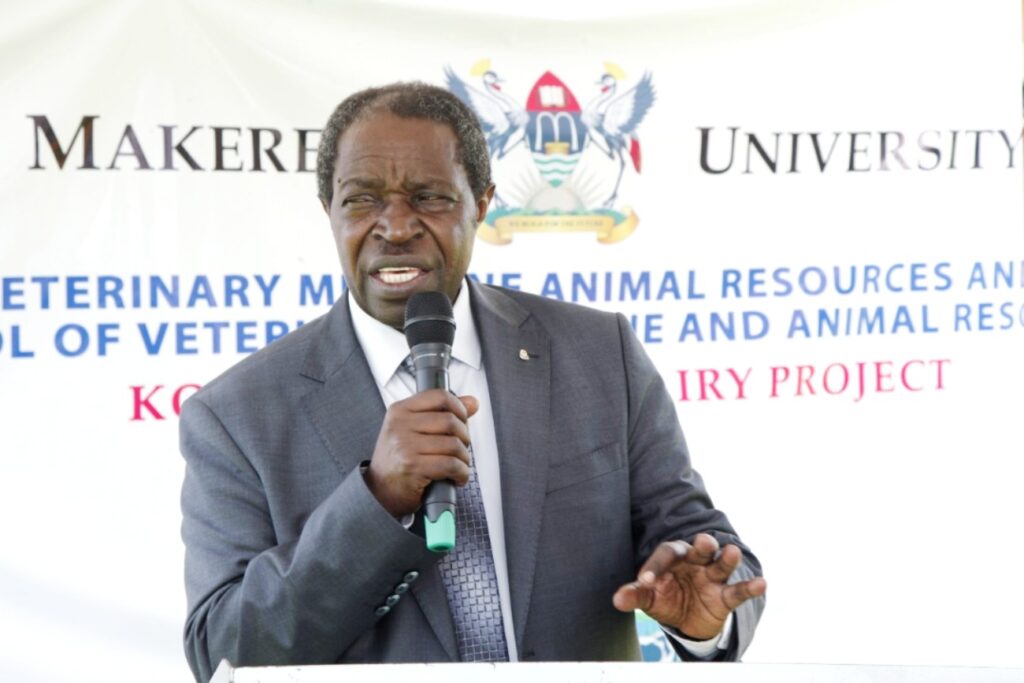
He thanked JNBU represented by Prof. LEE Hak-Kyo for the excellent collaboration and support for the successful initiation and implementation of KUDaP. He appreciated Prof. William Bazeyo for the great guidance, astuteness and good eye as Chairperson of the KUDaP Steering Committee and Prof. Robert Tweyongyere for his dedicated work as KUDaP Principal Investigator.
Prof. Tweyongyere in addition to acknowledging the support from Korean Government, JNBU, Ugandan Government and the Leadership of Makerere University noted that the beginning of the implementation phase calls for the establishment of another phase of infrastructure. He noted that as a Demonstration Farm, the facility will need to put in place training facilities and housing for all prospective students.
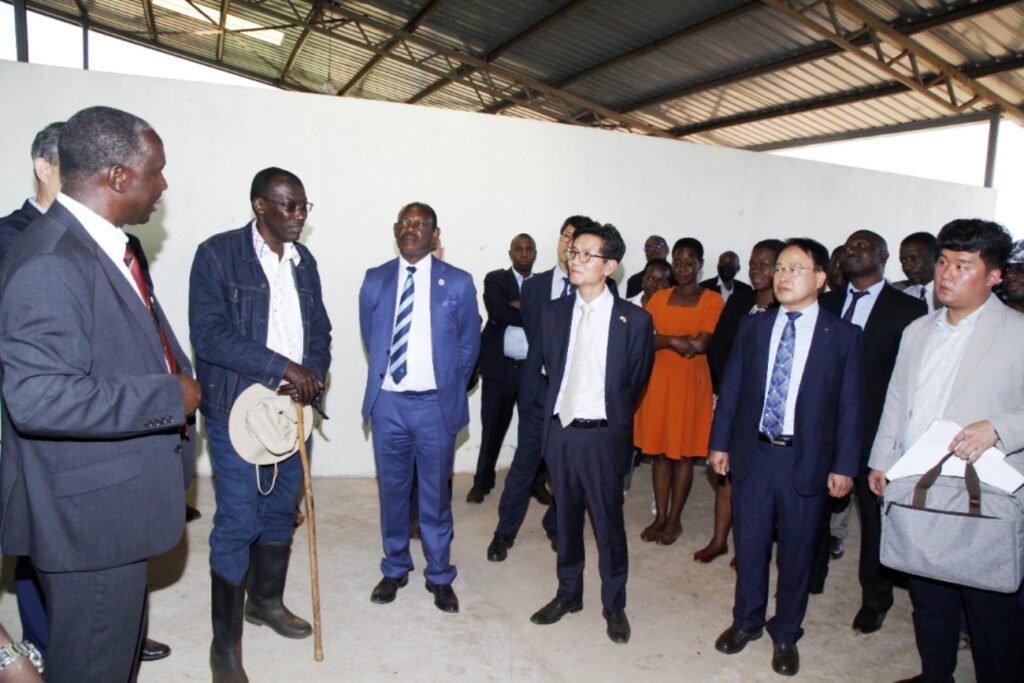
“In the next phase, apart from maintaining a healthy vibrant herd of animals, we need to cater for processing and value addition, as well as research, training and knowledge transfer to the community. We have already enrolled into a partnership of the dairy network and we want to ensure that we can be beneficial to our partners” said Prof. Tweyongyere.
The Dairy Development Farm facility will receive thirty thousand doses of Korean Holstein Fresian semen and two hundred embryos of Korean Holstein Fresian cattle. It comprises an office block, Integrated Micro Organism (IMO) cattle shed, state-of-the-art milking parlour, cattle dip, spray race and silage making facilities as well as farm implements such as two tractors and two pick-up trucks. The structures are surrounded by fields planted with highly nutritious Chloris gayana grass for hay and crops for silage production. A banana plantation has also been established to make the most of the manure produced by the cattle.
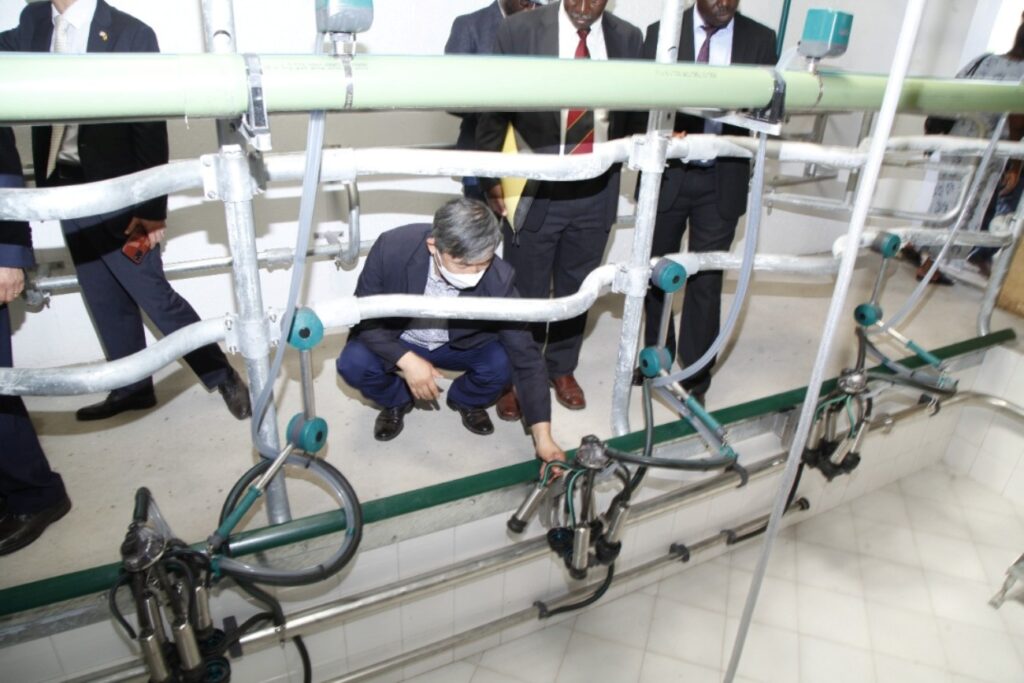
The event was moderated by Prof. Lawrence Mugisha, from the Department of Wildlife and Aquatic Animal Resources, SVAR, CoVAB and the Principal Public Relations Officer, Ms. Ritah Namisango.
At the same occasion, Makerere University presented appreciation awards to; Hon. KIM Byung-Soo, Prof. LEE Hak-Kyo, Prof. William Bazeyo and Norbrook (Uganda) Limited. In the same spirit, KRC presented appreciation awards to; Mrs. Lorna Magara, Counsel Innocent Kihika, Prof. Barnabas Nawangwe, Prof. Henry Alinaitwe, Prof. William Bazeyo, Maj. Gen. David Kasura Kyomukama, Prof. Frank Norbert Mwiine, Dr. Michael Kansiime, Prof. Robert Tweyongyere and Dr. Clare Mugasa.
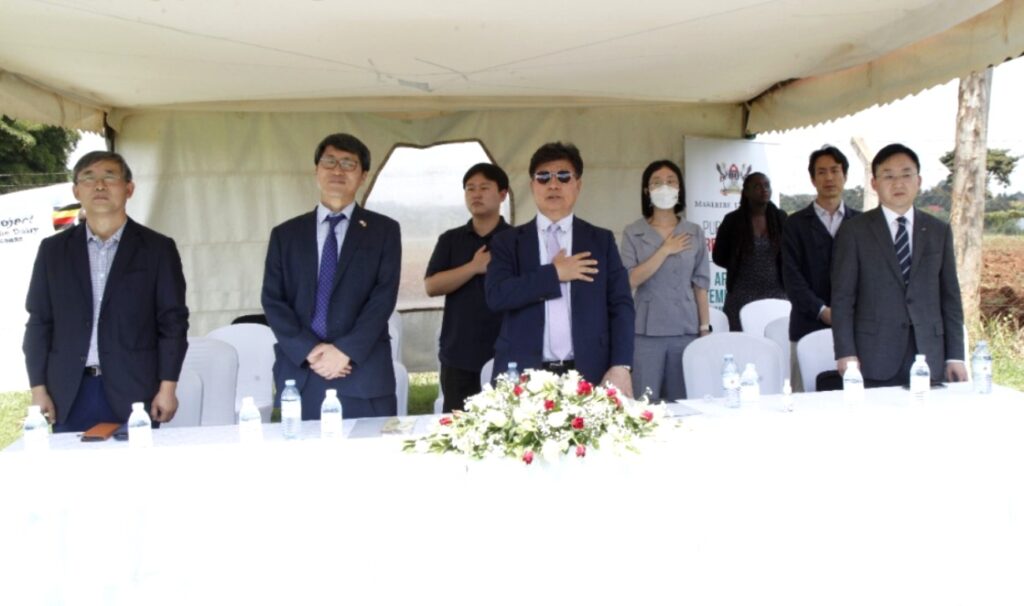
You may like
-
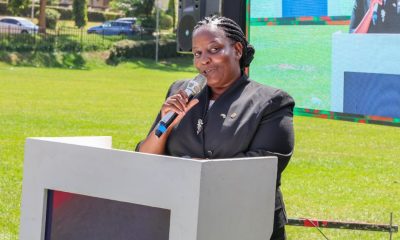

Emorimor Calls for Makerere to Upgrade Parenting Course
-
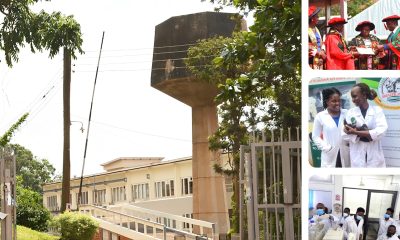

CoVAB Annual Report 2024
-
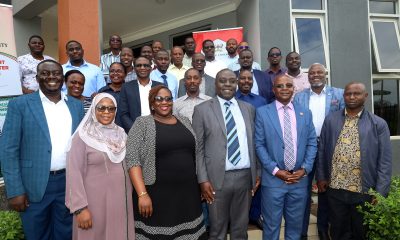

Uganda Deepens Economic Governance with Training on Regulatory Cost-Benefit Analysis
-


UVCF Makes Case for HEAC Programme
-


Mastercard Foundation Board pays its inaugural visit to Makerere University
-
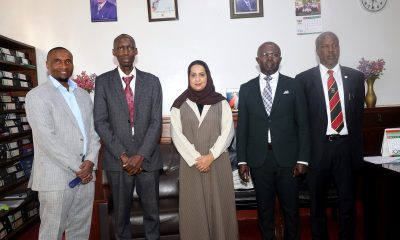

Mak CEES discusses partnership with King Salman Global Academy for the Arabic Language
Veterinary & Biosecurity
CoVAB Annual Report 2024
Published
2 days agoon
June 30, 2025By
Mak Editor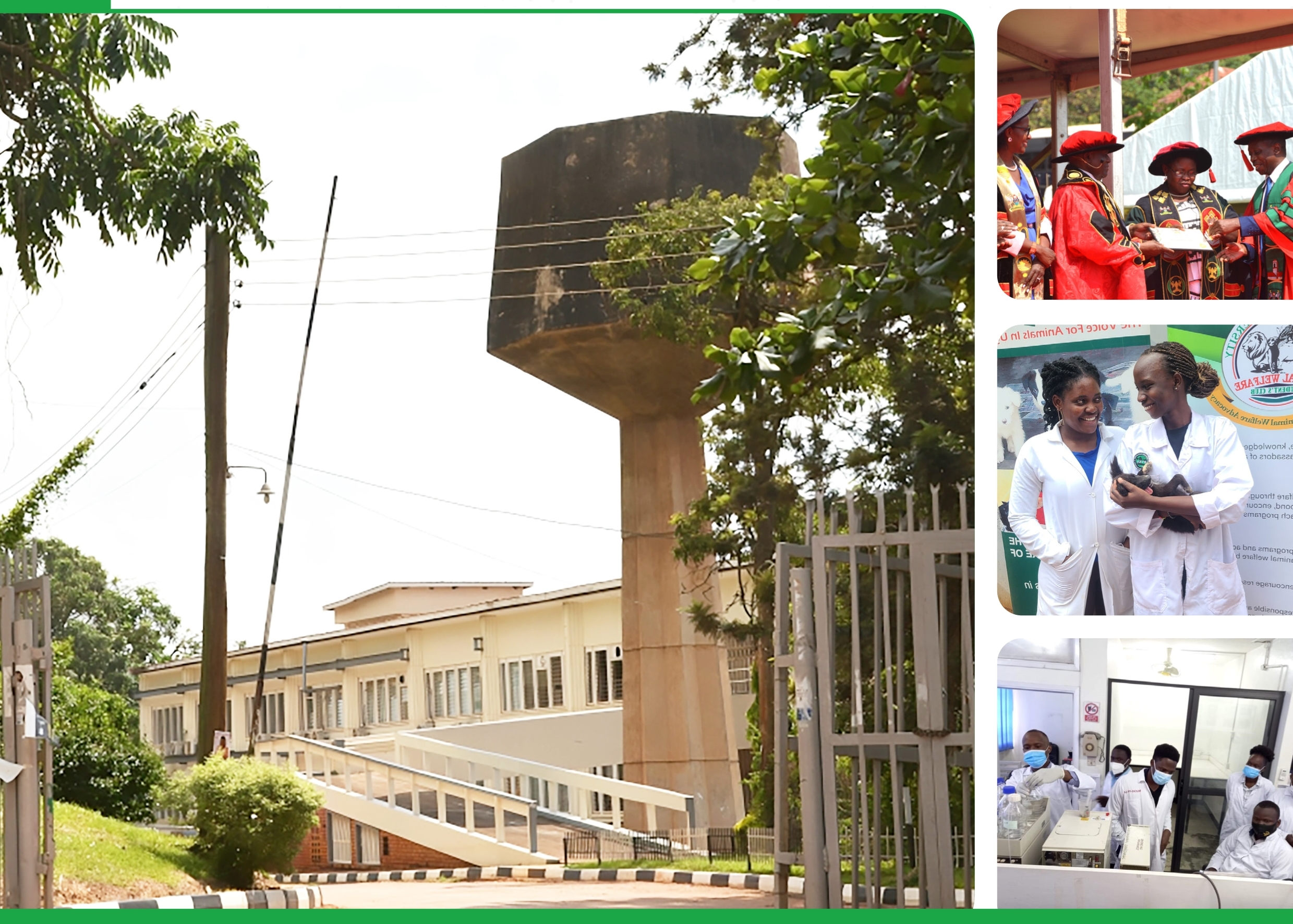
It is my pleasure to share the Annual Report for the year 2024, highlighting the various milestones realized in the College of Veterinary Medicine, Animal Resources, and Biosecurity. First and foremost, I wish to congratulate all of us for the dedication and effort rendered in the running of the college during the period. This collective commitment enabled us to excel in several areas, in line with the mandate of the college and Makerere University at large.
Our mandate teaching and learning, research and innovation, as well as knowledge transfer and partnerships, has been diligently pursued through the concerted efforts of all stakeholders, students, teaching staff, administrative teams, and valued partners. The college takes pride in the contributions made by our partners, who continue to support us in fulfilling this mandate. We particularly appreciate Norbrook (U) Ltd, which has consistently recognized the best-performing veterinary students with cash prizes annually since 2021.
Among the key achievements in 2024 was the expansion of research facilities at CoVAB. The college successfully established new, state-of-the-art laboratories, including an advanced Biomarker Discovery and Translation Research Laboratory, which continues to lead in developing point-of-care diagnostic kits for infectious and noncommunicable diseases, including cancer. The Biomarker Discovery and Translation Research Laboratory at CoVAB represents a significant leap in biomedical research and innovation. This state-of-the-art facility is dedicated to identifying and translating biomarkers into point-of-care diagnostic kits for both infectious and non-communicable diseases, including cancer. In this regard, CoVAB is poised to make tremendous contributions and impacts in advanced diagnostic development through rapid, accessible, and cost-effective diagnostic tools that can be used in both human and veterinary medicine, thereby contributing to improving early disease detection and treatment outcomes.
In the area of interdisciplinary research, the laboratory fosters collaboration among veterinary scientists, medical researchers, and biotechnologists, ensuring a holistic approach to disease management. Given the increasing prevalence of zoonotic diseases, the lab plays a crucial role in bridging veterinary and human health research, contributing to global health security and supporting One Health initiatives. Other achievements at the college are visible in groundbreaking research projects, with several initiatives launched, including studies on zoonotic disease prevention, vaccine development, and drug action mechanisms.
In the area of community outreach, the college expanded its livestock health programs, providing veterinary services to rural communities and enhancing disease surveillance. This is coupled with the increased international Collaborations where CoVAB strengthened partnerships with global institutions, securing funding for One Health initiatives aimed at tackling emerging health challenges.
These advancements and more not mentioned strategically position CoVAB and Makerere University as key players in addressing major animal and human health challenges, particularly zoonotic diseases, which constitute a significant proportion of emerging and reemerging infectious diseases.
The achievements highlighted in this report would not have been possible without the unwavering support, dedication, and collaboration of various stakeholders. We extend our heartfelt gratitude to our students, who are the backbone of our academic community, and whose commitment to learning, research, and innovation continues to propel CoVAB to greater heights. The dedication of our lecturers, researchers, and administrators has been instrumental in driving the college’s mandate forward. Your passion for education, mentorship, and scientific discovery is deeply appreciated. The partners and collaborators, including institutions, organizations, and industry stakeholders such as Norbrook (U) Ltd, have supported our initiatives and strengthened our capacity through funding, knowledge exchange, and collaborative projects. Your contributions are invaluable.
Together, these contributions have made 2024 a truly remarkable year for CoVAB. As we move forward, we remain committed to strengthening these partnerships and building on our shared successes. Thank you for being part of our journey. As we move forward, we anticipate an even more successful period ahead, and together, we shall achieve all that we set out to do.
Prof. Frank Norbert Mwiine
PRINCIPAL
Research
Mak and MSU Host Landmark Symposium on Insects for Food, Feed, and Food Security in Africa
Published
3 weeks agoon
June 10, 2025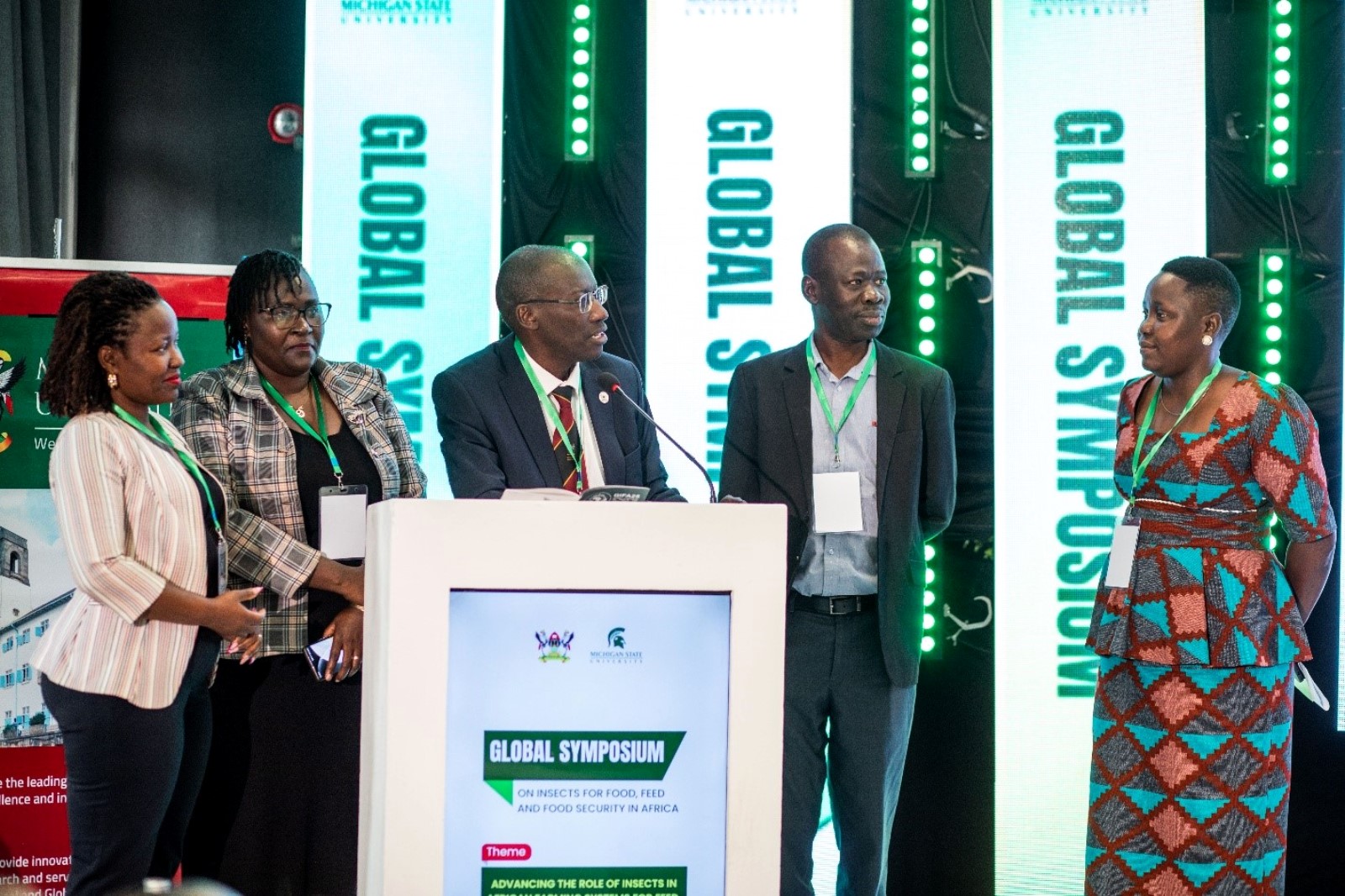
A groundbreaking symposium exploring the role of insects in African farming systems concluded on June 6th, 2025, at Onomo Hotel in Kampala. Convened by Makerere University’s College of Veterinary Medicine, Animal Resources and Biosecurity (CoVAB) in collaboration with Michigan State University (MSU), the event drew participants from over ten countries, including researchers, development experts, regulators, and practitioners.
Under the theme “Advancing the Role of Insects in African Farming Systems for Feed, Food, and Food Security,” the two-day gathering aimed to share knowledge and experiences on integrating insects into food and feed systems to address food security challenges across the continent. The discussions revolved around four key sub-themes namely; Insects as animal feed to promote sustainable livestock production and livelihoods; Insects for human food and food security, including indigenous insect-based diets; Insects for improved soil health and crop production and Commercialization of insect farming, with a focus on regulation and standardization.
The symposium commenced with opening remarks delivered on behalf of Makerere University’s Vice Chancellor, Prof. Barnabas Nawangwe, by his representative, Prof. Frank Norbert Mwiine, Principal of CoVAB. He welcomed participants and commended Dr. Deborah Amulen, Lecturer at CoVAB and chief convener, for organizing a well thought out event. He emphasized that the symposium would not only raise awareness of the role of insects in Uganda’s and Africa’s socio-economic development but also help place insects on the agenda for broader discussions and integration into food security strategies. He said the event served as a platform for knowledge exchange, highlighting the untapped potential of insect farming in transforming food security, sustainable agriculture, and economic growth.
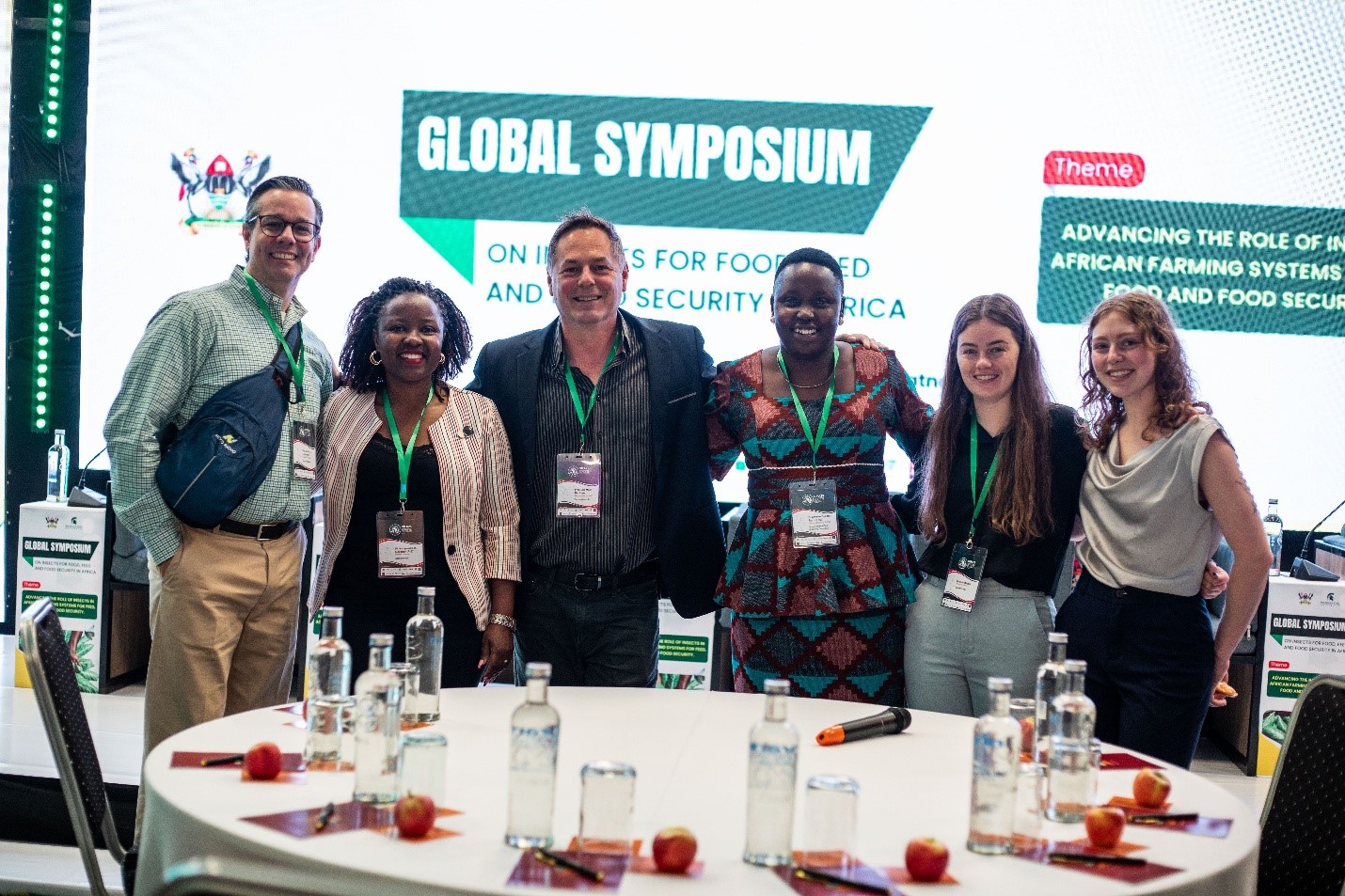
Key facilitators at the symposium were esteemed experts from leading institutions worldwide, who shared their insights on insect-based food systems and sustainable agriculture. Among the distinguished speakers were Prof. Jeffrey K. Tomberlin from Texas A&M University, Prof. Eric M. Benbow from Michigan State University, Prof. Florence Dunkel from Montana State University, Dr. Denise Beesigamukama, a Postdoctoral Fellow, ICIPE Kenya and Dr. Deborah Amulen the host from Makerere University. These are exemplified in their contribution towards academic research and leadership, policy and industry impact and more importantly their expertise in insect science.
During the deliberations, the experts emphasized that insects offer a viable, sustainable, and nutrient-rich solution to Africa’s growing food demands. The event underscored ongoing research and commercialization efforts aimed at mainstreaming insect farming into the agricultural sector. As global interest in alternative protein sources continues to rise, the symposium marked a significant step toward harnessing the potential of insects to enhance food security in Africa.
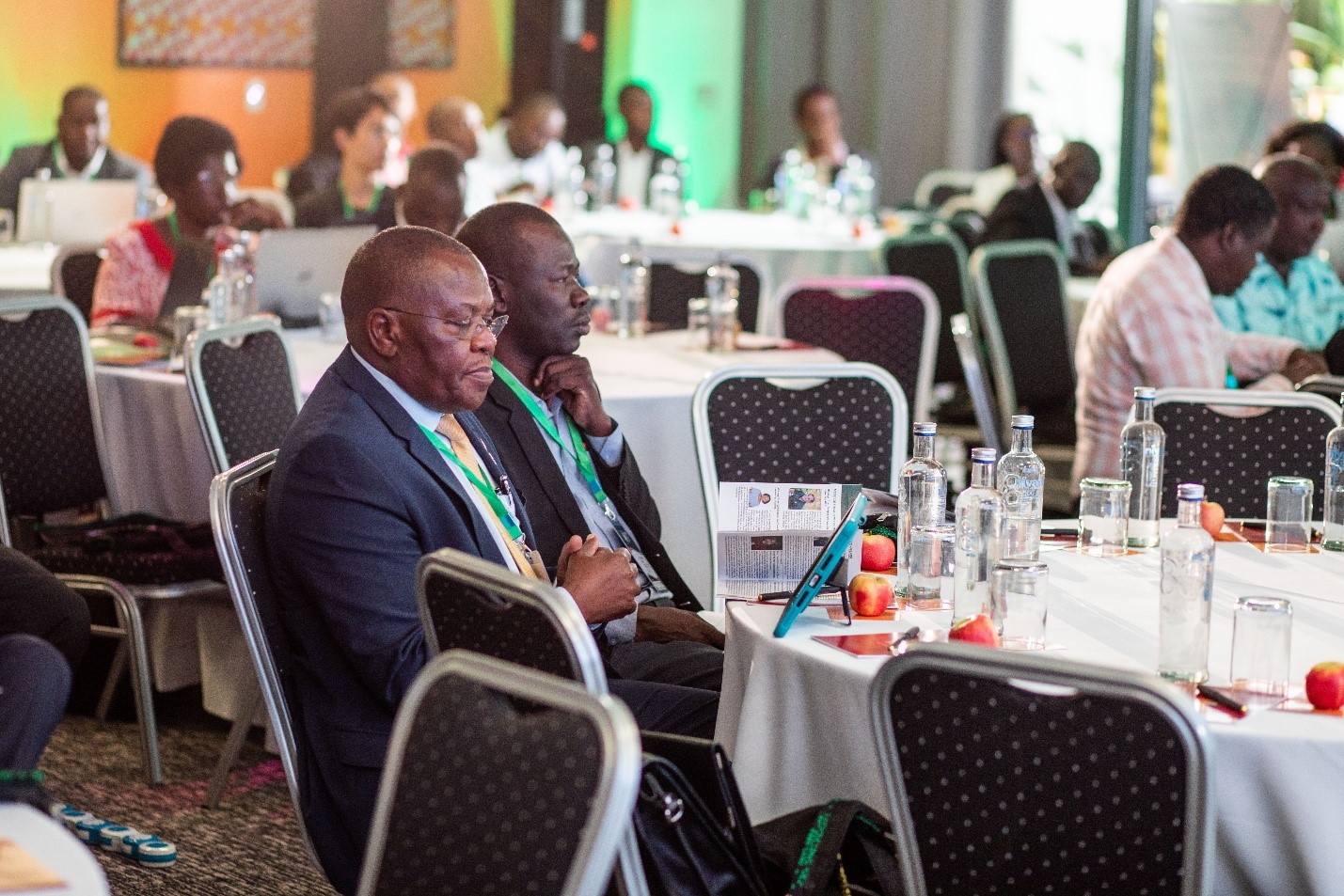
Experts underscored that Africa is home to over 470 recognized edible insect species, providing a rich source of proteins, fats, and essential micronutrients. Insects have historically been a staple in diets across Uganda, Southern Africa, and other regions, serving as a vital food source in times of drought, conflict, and food scarcity. One of the most discussed innovations at the event was the large-scale farming of Black Soldier Fly, which is being utilized to produce not only the larvae but also frass, a high-protein animal feed and organic fertilizer to enhance soil health and boost agricultural yields.
Several scholars presented their research in the area of Insects, where together with the farmers, industry representatives, policy makers and practitioners contributed valuable perspectives on advancing the role of insects in food security, animal feed, and ecological sustainability in Africa. Their discussions underscored the importance of research, policy, and commercialization in expanding insect farming across the continent.
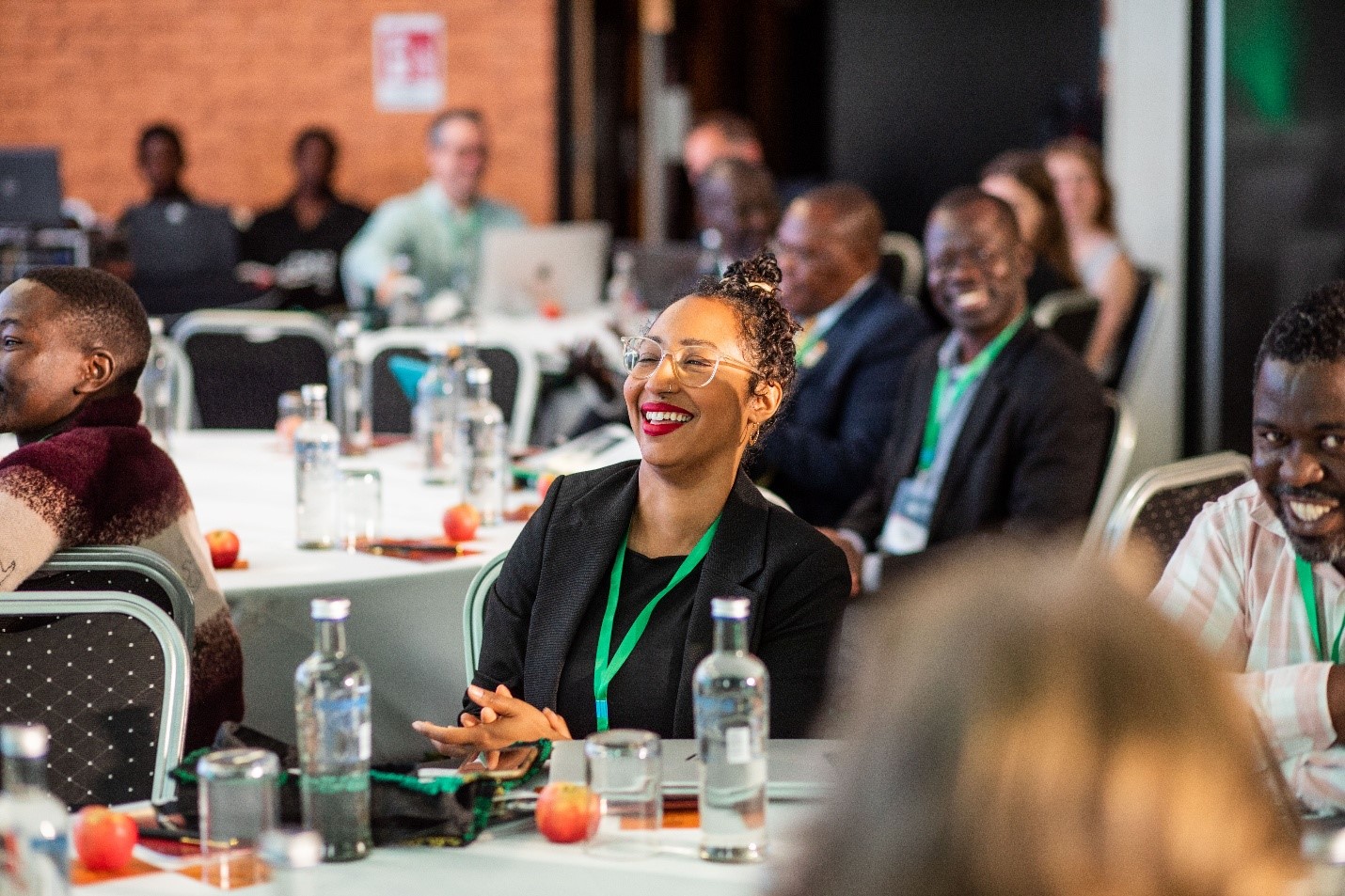
One of the keynote discussions highlighted Uganda’s rich tradition of consuming insects as part of its food culture, reinforcing their significance in nutrition and sustainability. Participants shared insights on local insect consumption practices and their role in livelihoods, drawing from countries like Cameroon, Malawi and many others represented at the event. The forum also featured representatives from key institutions, including the National Council for Science and Technology and The National Agricultural Research Organization (NARO) which contributed perspectives on research, policy development, and commercialization of insects as sustainable food sources, the Ministry for Agriculture, Animal Industry, and Fisheries (MAAIF), emphasizing the Ugandan government’s support for insect farming initiatives.
The Kenya based scientific research institute, the International Centre of Insect Physiology and Ecology (ICIPE) played a key role in the discourse and exhibited several innovations arising from research and their work in insects. Experts explored how insects can revolutionize animal feed production, providing an affordable, high-protein alternative to conventional sources.
With global attention shifting toward alternative and sustainable food sources, experts stressed the need for policy standardization and enhanced investment in insect-based food systems across Africa. During the event, MAAIF announced a $325 million investment through a six-year Smart Agriculture Transformation Project, aimed at expanding sustainable farming practices, reducing environmental impact, and increasing food security through alternative protein sources.
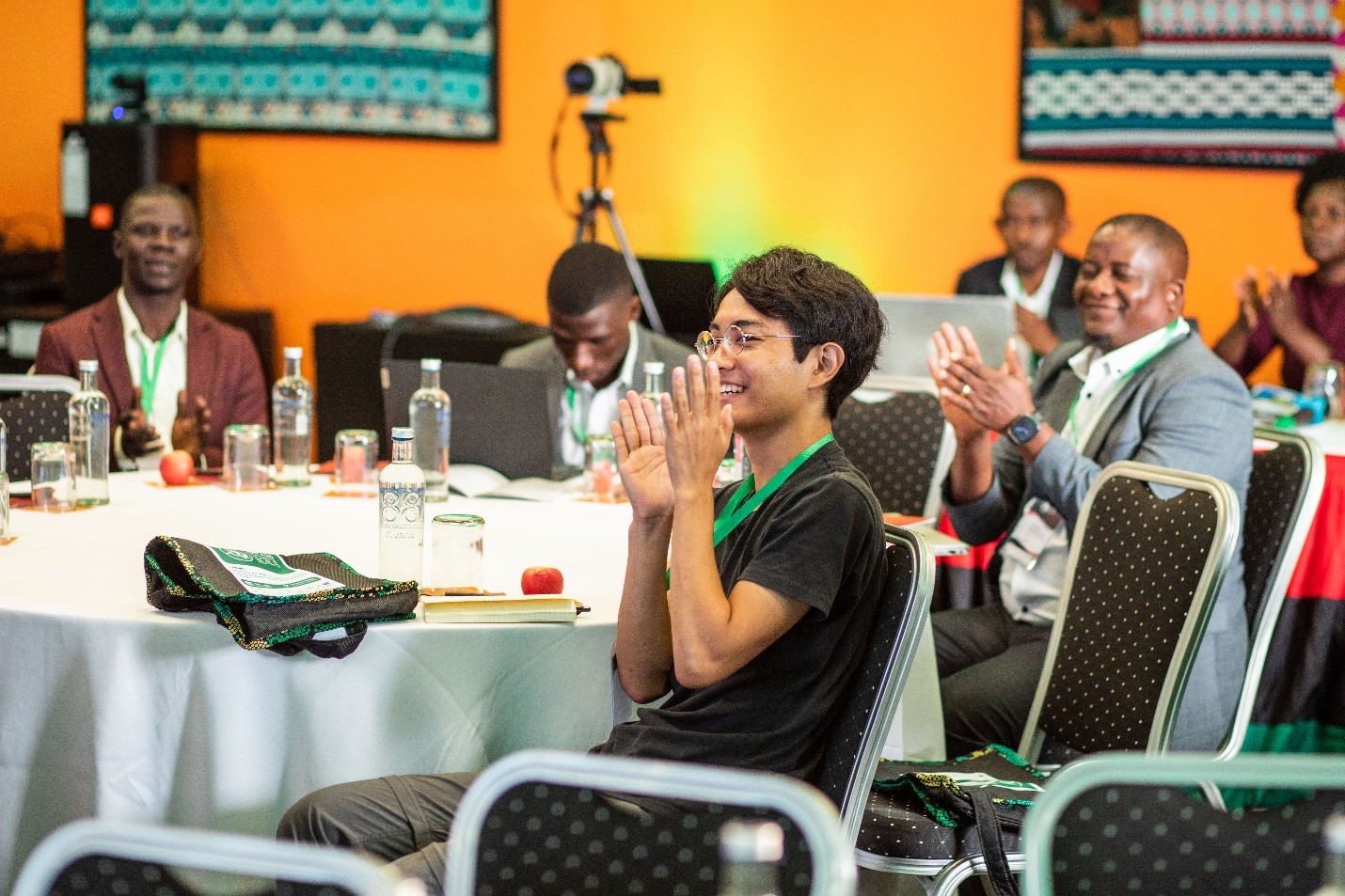
The symposium reaffirmed Africa’s position at the forefront of insect farming research, with discussions centered on scaling production, improving regulation, and leveraging indigenous knowledge for food security solutions. Moving forward, participants emphasized the importance of quality control, standardization, and policy frameworks to ensure safety, scale production, and boost market competitiveness. With Uganda leading discussions on alternative protein sources, the symposium laid the foundation for future innovations in agriculture.
Veterinary & Biosecurity
Makerere Receives Scientific Equipment worth over UGX 1.4 Billion
Published
3 weeks agoon
June 10, 2025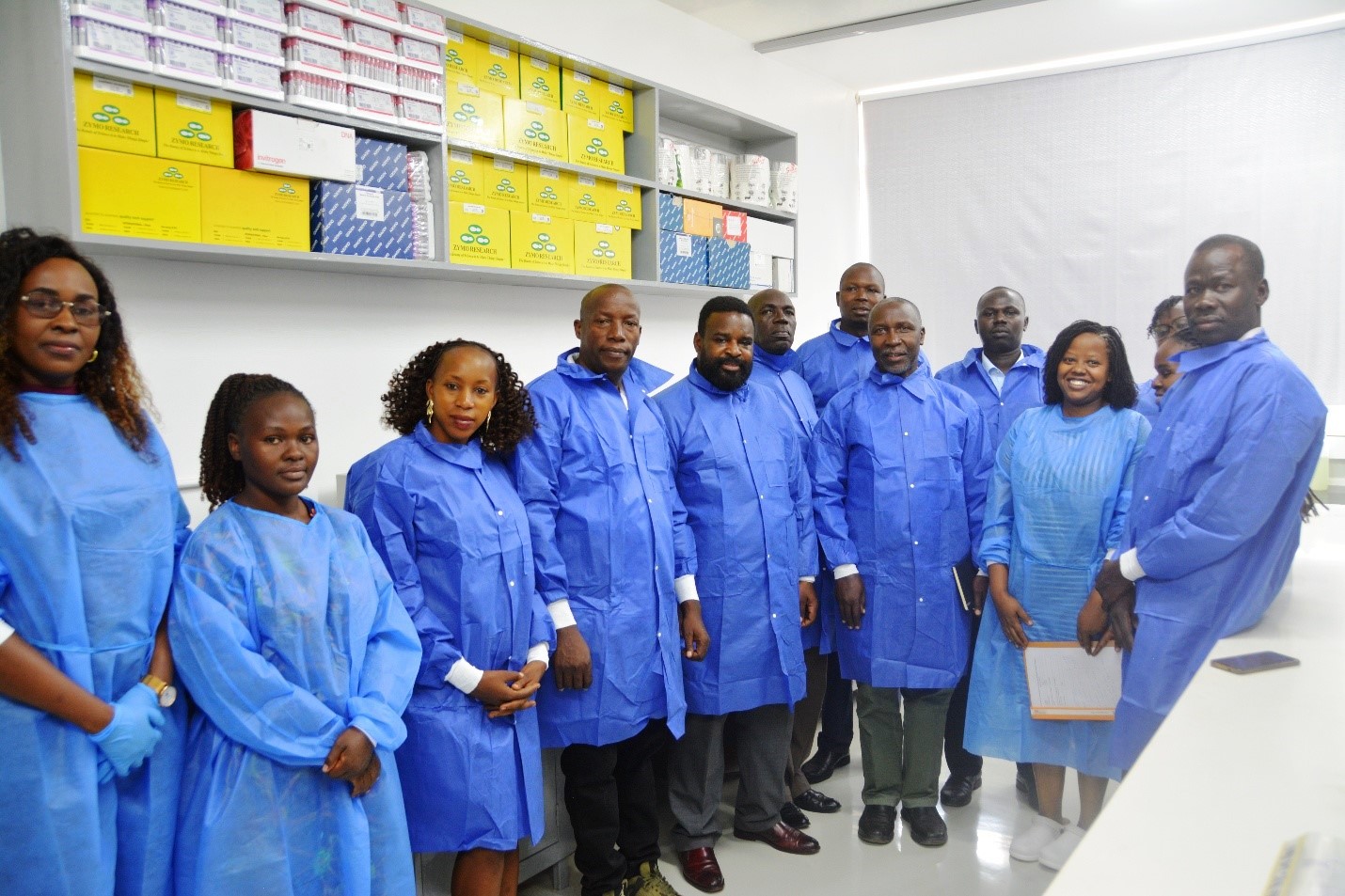
Makerere University has secured a valuable donation of scientific laboratory equipment worth USD 400,000 (Shs. 1.4 billion) through the Seeding Labs’ Instrumental Access Program. This equipment will significantly enhance teaching, research, and diagnostic services at the College of Veterinary Medicine, Animal Resources and Biosecurity (CoVAB).
Following the announcement of a successful application in May 2024, Makerere joins a global network of 137 institutions across 39 countries, gaining access to advanced tools that will elevate STEM education and innovation. This development strengthens the university’s commitment to scientific excellence and fosters collaboration in veterinary medicine and related fields.
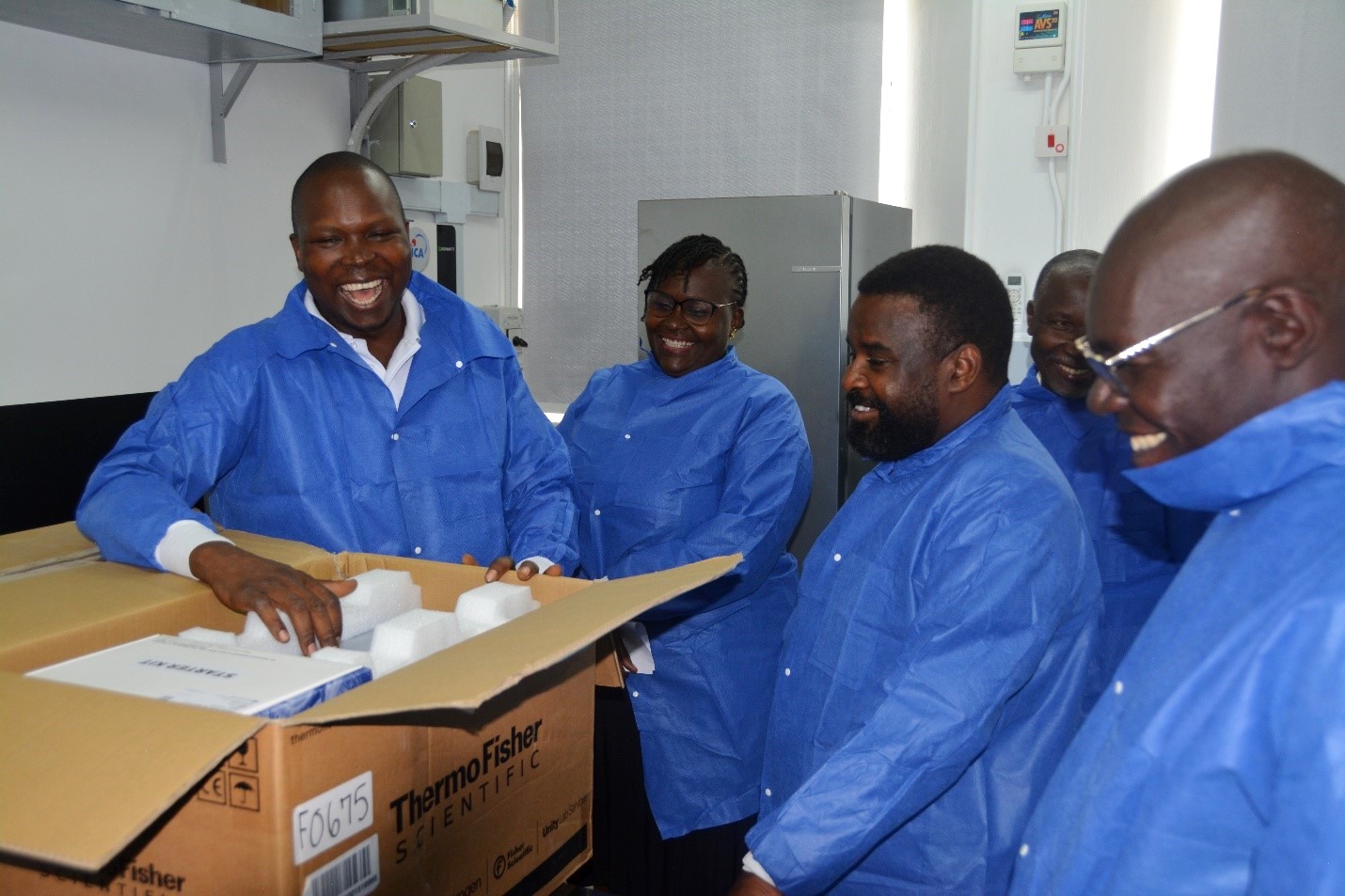
The consignment was received at the College of Veterinary Medicine, Animal Resources and Biosecurity and witnessed by Prof. Edward Wamala, who represented the Vice Chancellor, Prof. Barnabas Nawangwe. In his remarks, Prof. Wamala described the newly acquired scientific equipment as a significant milestone in Makerere University‘s pursuit of academic excellence, innovation, and impactful research. He emphasized its transformative role in strengthening research infrastructure, advancing ongoing scientific inquiry, and empowering both students and faculty to engage in high-impact studies.
Expressing appreciation to Seeding Labs’ Instrumental Access Program for their partnership, he underscored that this contribution was more than a donation, rather an investment in the future of Uganda and Africa at large. He highlighted that the support reflects confidence in Makerere’s students and scientists, recognizing their responsibility to address pressing global challenges in animal health, biosecurity, and public health.
Prof. Wamala further noted that the College of Veterinary Medicine, Animal Resources, and Biosecurity plays a vital role in addressing issues at the intersection of human, animal, and environmental health which is the core of the One Health approach that is emphasized today. With the newly acquired equipment, the college’s capacity will be greatly enhanced, improving diagnostic capabilities, supporting the livestock industry, and contributing to disease surveillance efforts at both local and national levels, he noted.
The Deputy Principal CoVAB, Assoc. Prof. James Okwee-Acai said the equipment received is a significant milestone in the college in its efforts to strengthen science and research capacity. He commended the management of Makerere University for the contribution and support that enabled the shipment and clearance of the consignment. While commenting about the equipment contained in the donation, Prof. Acai said many of items were state-of-the-art and would definitely boost the work of teaching and learning at the college across the two schools.
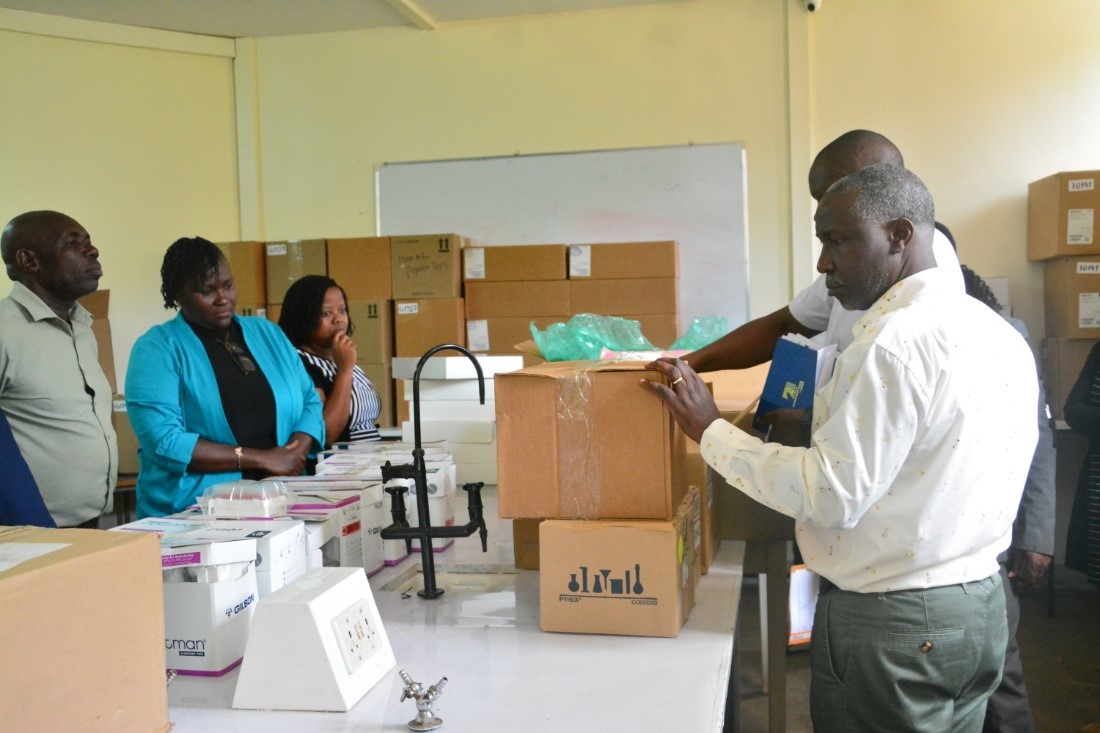
The equipment is expected to greatly enhance the University’s ability to conduct cutting-edge research and provide high quality education in the veterinary sciences. This donation showcases the growing partnerships and collaborations that Makerere University is building to drive innovation and academic excellence. With this valuable addition to its research infrastructure, Makerere University is poised to make even greater strides in advancing scientific knowledge and addressing critical challenges in the veterinary field and looks forward to the transformative impact it will have from training students on the latest analytical techniques to enabling faculty led studies that advance veterinary medicine.
The donors, the Instrumental Access is the flagship program of Seeding Labs, which is a US-based NGO with a mission to increase access to resources for science in developing countries. CoVAB’s participation in Instrumental Access makes Makerere University a member of the community of 137 Instrumental Access awardees in 39 countries worldwide.
The Department of Veterinary Pharmacy, Clinical and Comparative Medicine, Makerere University was chosen for the Instrumental Access award after a rigorous and competitive selection process that receives and evaluates applications from institutions around the world. To be considered, applicants outlined the ways that an infusion of scientific equipment would remove barriers to STEM education and research at their institution, paving the way for new avenues of scientific inquiry and expanding hands-on opportunities for students.
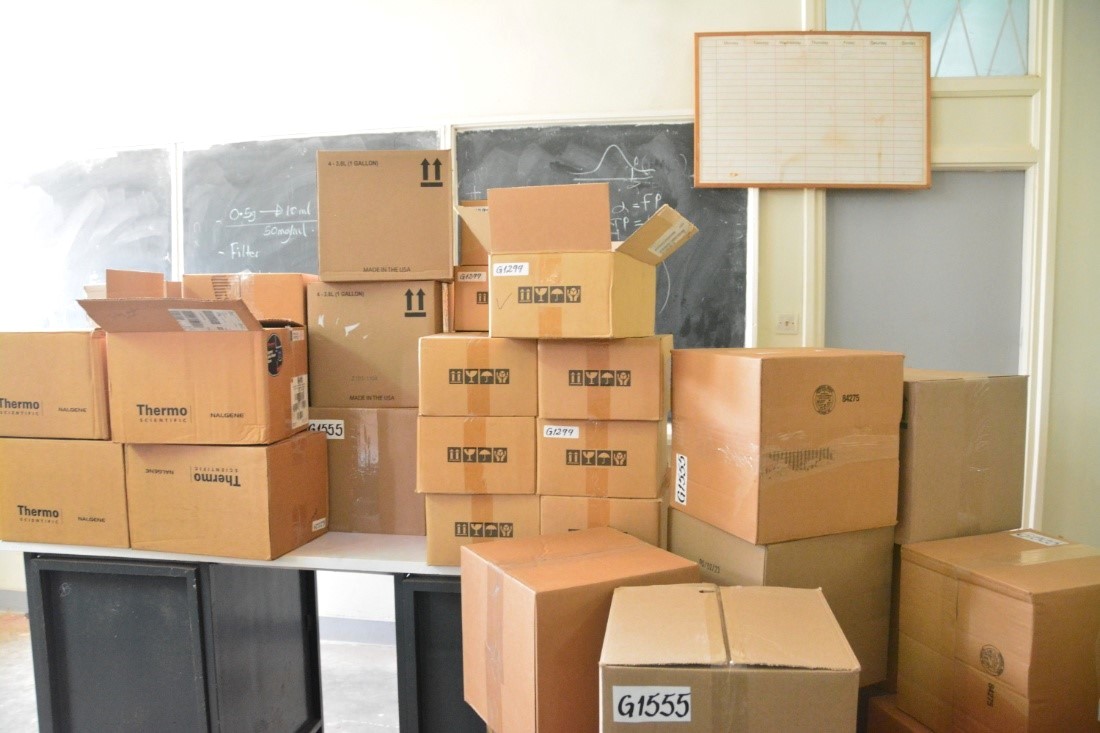
The equipment will provide a foundation for other critical resources that allow scientists to generate new knowledge, leverage sustainable funding, and better prepare university students for the scientific workforce and innovation economy.
More photos from the unveiling
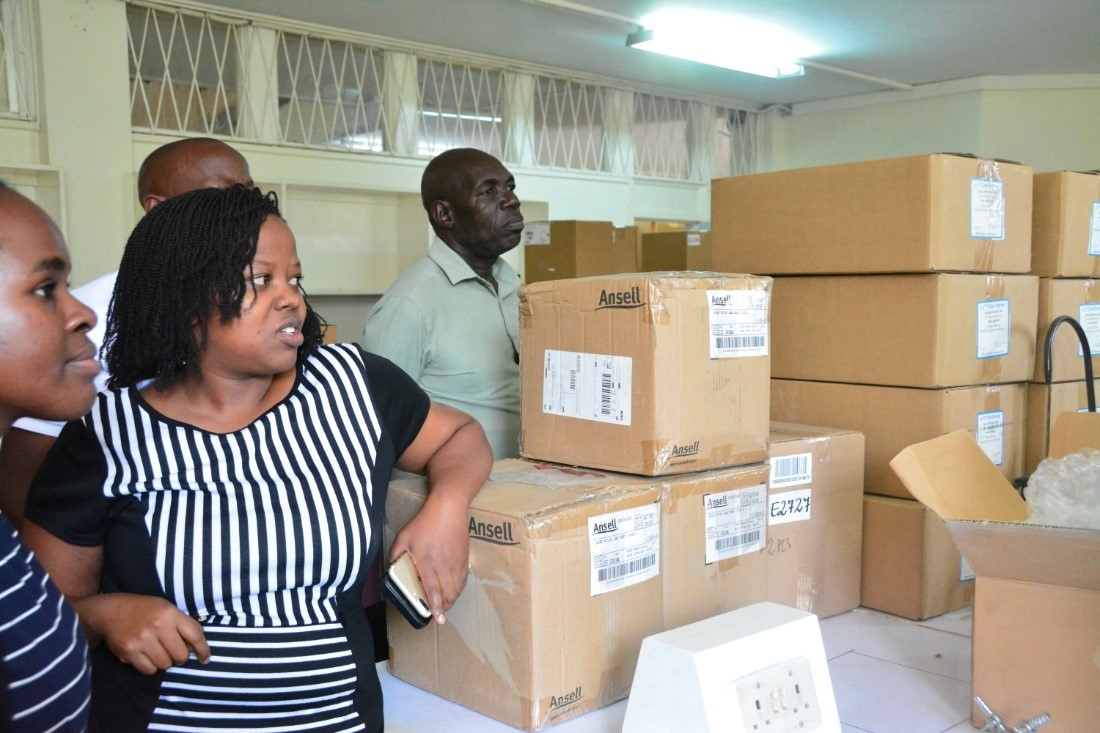
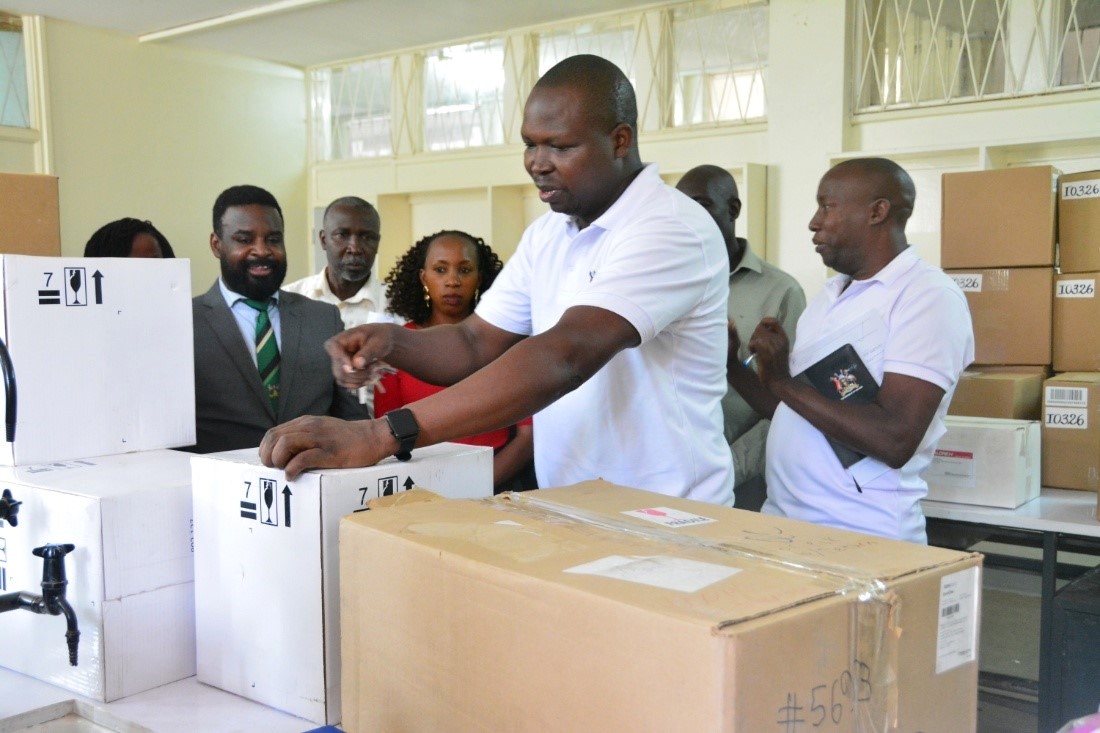
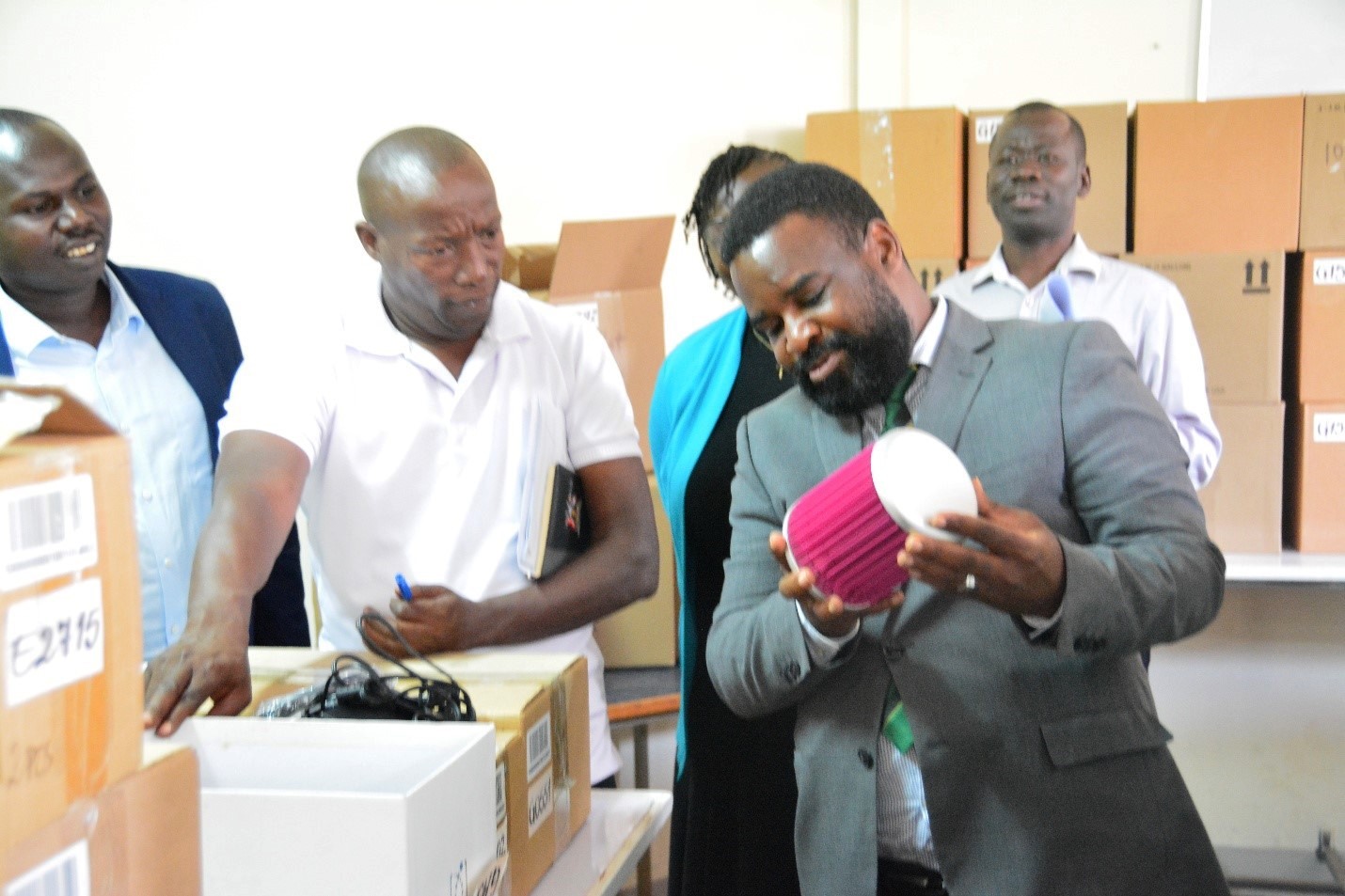
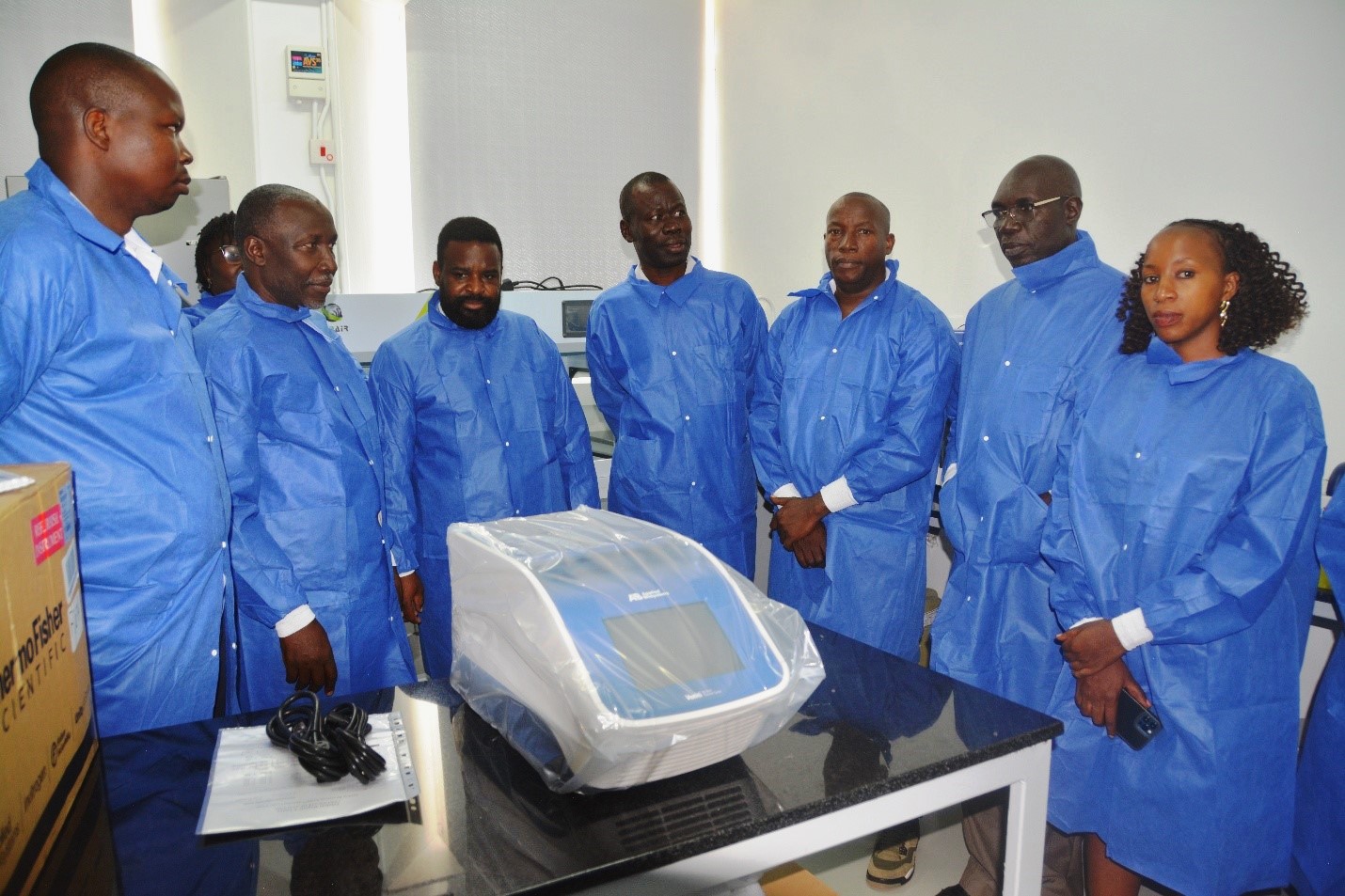
Trending
-

 General4 days ago
General4 days agoMature Age Scheme Exam Results for 2025/2026
-

 General1 week ago
General1 week agoFreshers’ Joining Instructions 2025/2026
-

 General1 week ago
General1 week agoMastercard Foundation Board pays its inaugural visit to Makerere University
-

 General1 week ago
General1 week agoUVCF Makes Case for HEAC Programme
-
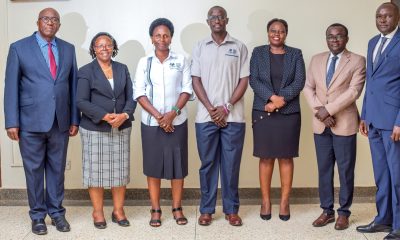
 General2 weeks ago
General2 weeks agoCall For Expression of Interest: MURBS MIS Requirements Gathering
